#get it cause she was launched in 1972
Text
Déjà Vécu: Chapter Thirteen
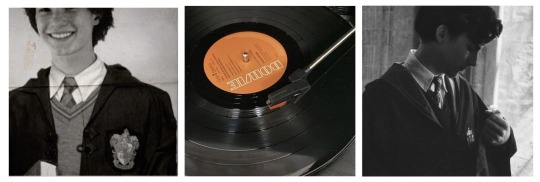
Chapter Thirteen : It Ain't Easy
Summary: Sirius turns 13.
Characters: Remus Lupin/Reader, Sirius Black/Reader (no use of y/n), James Potter, Petter Pettigrew, Regulus Black, Marlene McKinnon
Warnings: Minors DNI, 18+ only!, angst, anxiety/overwhelming feelings, language, mentions of death and self harm, mentions of abuse, mentions of drinking.
Read on AO3
Companion Playlist
Déjà Vécu Masterlist
------------------------------------------------------------------------------
November 3rd, 1972
“—Let the children lose it!”
“Let the children use it—“
“—“Let all the children boogie!”
Sirius and James were perched on top of the table in the Gryffindor Common Room, scream-singing along to Starman while the rest of them watched in amusement.
She leaned towards Remus on the couch beside her, “I’m beginning to regret buying him his own copy of Ziggy Stardust…”
“You’re not the one that has to live with him—“ Remus deadpanned, watching carefully as Sirius launched himself off of the table, leaping gracefully onto the rug by the fireplace. His 13th birthday fell on a Friday this year, meaning the party in Gryffindor Tower was bound to be an all-night affair. School proverbially kicked her ass the past week, but she knew that Sirius needed all of them to be there tonight, whether he wanted to admit it or not.
A week prior she had watched as Sirius approached Regulus about coming to his birthday party. They had some free time in-between classes, and took to lounging on the South Lawn in the unseasonably warm afternoon air. Mid-conversation, Sirius visibly checked out, staring off towards the castle. She caught his change in demeanor, following his eyes to find Regulus chatting with two other Slytherin first-years near the open courtyard door.
She tapped him with her foot, “Go talk to him.”
Sirius gave her a look, turning his focus back to the textbook in his lap.
“Siri, he’s your brother—“
“—yeah and he’s made it abundantly clear he doesn’t want to associate with the ‘stain’ on the Black Family name,” the bitterness in his voice was palpable.
She rolled her eyes; were all purebloods this dramatic?
“You’re gonna have to speak to him sometime, mate, Christmas holiday is coming up,” Remus didn’t even look up from his book. Sirius pretending to ignore him.
She tipped the front of his textbook down to get his attention, “Why don’t you invite him to your party? Tell him to bring his friends!”
Sirius glanced back over towards his younger brother, thinking the notion over.
“What d’you have to lose?” She leaned back on her elbows again, closing her eyes and basking in the warmth of the sun.
The sound of his book falling onto the grass caused her to look up, watching as he briskly made a beeline over towards Regulus. They were too far away to hear the conversation, but when Sirius turned back around, the expression on his face said everything she needed to know. As he sat back down beside her, she glanced back.
The two first-years were laughing in Sirius’ direction, Regulus standing stone-faced in-between.
“What’d he say?” Remus asked.
Sirius picked up his discarded textbook, “I’d rather not repeat it.”
———
The morning of his birthday, Sirius received a roaring rendition of ‘Happy Birthday’ at breakfast, eventually growing into an entire Gryffindor House serenade. As red as his face was, you could tell he loved the attention. He hadn’t received so much as an owl from his family, something she was already expecting, which led her to bring his birthday gift to breakfast rather than waiting until later that night. Ziggy Stardust had been released that summer, and after listening to the first track she knew Sirius would love it. He tore open the brown paper ravenously, and when he saw the name David Bowie emblazoned on the cover, his blue eyes flashed to hers.
“I could kiss you right now—“
She made a face at him from across the table, “Please don’t, I’d love to keep my food down.”
Smirking, she went back to her breakfast, while Sirius handed the album to Remus for him to inspect. His excitement was short-lived, because the next time she glanced across the table he was staring longingly at Regulus.
While she had stacked classes all day, the Gryffindor boys had a free day after morning Transfiguration. Remus let her know later that day that Sirius had apparently been blasting his new record over and over much to the disdain of Lily Evans, who’s record player he had completely commandeered.
Ziggy was the soundtrack to the night, Sirius becoming more and more erratic as the party went on. Everyone seemed to be having a fun time, but she couldn’t help but worry about him. After a particularly sloppy rendition of It Ain’t Easy, Sirius flopped beside her on the couch by the fireplace, smiling ear to ear as he leaned his head back. She didn’t say a word as she watched his eyes close, humming along to Star.
“Having a good birthday?” She asked, voice low as Sirius lolled his head to the side.
His eyes were slightly bloodshot as he grinned, “The best.”
She giggled, “What’re you so smiley for?”
“Wanna know a secret?” He whispered, the tiny glimmer of mischief that she knew very well was prominent in his eyes.
“Uh…sure?” She was apprehensive when it came to one of Sirius’ ‘secrets’. They were usually something that would get them all in huge trouble, like that time last year when he surprised James with a “secret” pick-up game of quidditch for his birthday. It was all just an excuse to fly around in the invisibility cloak and throw dungbombs at the Slytherin team.
Sirius grabbed her hand and led her up to the boys dormitory, turning around to shush her dramatically as the door creaked open. Making a beeline for his trunk, he began to dig through piles of clothes and other paraphernalia until emerging with a bottle of brownish-red liquid.
“Ta-da!” He presented it to her like a precious relic.
She took the bottle and read the label: Ogden’s Finest Firewhisky.
“Sirius—“ she whispered, “—are you drunk?”
He grinned devilishly at her, “Nicked it from my parents over the summer. Thought I’d start 13 off with a little bit of fun!”
Her eyes didn’t leave the bottle as she shook her head.
“Wanna try some?” He quickly grabbed it back, taking a swig of the amber liquor as she watched in mild horror.
“Siri—stop!” She ripped it out of his hands, splashing some onto the floor by their feet.
“What’re you doing!” He glared at her angrily, reaching back for the bottle but ultimately failing.
“Me? What’re you doing?!” Her eyes narrowed as he swayed slightly on his feet.
“I’m trying to have a good time—“ he began to match her energy, adopting a similar prickly tone.
“—no you’re not, you’re hiding,” she tried to speak more calmly; upsetting him on his birthday was the last thing she wanted.
Sirius scoffed at the accusation, “I’m not hiding, I’m right here, you know exactly where I am.”
“No I don’t…none of us do. Physically yes, you’re here, but mentally you’re—somewhere else that I can’t find you.”
“…what’s that supposed to mean?” His eyes narrowed.
She sighed, “I get it—you’re fighting with Reg, but you don’t need to shut us out—“
“—You don’t know shit about what’s going on with my family,“ his voice rose, a jolt of panic striking her body.
“Because you won’t let any of us in!” She yelled, the frustration that was Sirius Black finally getting to her.
“Fine! You wanna hear about my brother? About how poor little Reggie sits in the pocket of my mother, obeying her every command while she moulds him into the perfect little Black heir? Or maybe about my father, of how he pretends I don’t even exist anymore; I’m just a ghost, haunting the upper floors of the house when I’m home on holiday.”
Eyes wide, she watched him grow more irate as he went on.
“—and my mother. Oh, yes, you’d love to hear more about her. The proudest pureblood you’ll ever meet. What a shame she raised a filthy little blood-traitor, who spends his time running around with muggleborns and the lower class—“
“Siri, I—“
“—You met her, back in Diagon Alley, remember? Lovely woman, a bit too shrill in my opinion,” his voice was humorless as he smiled, walking closer towards her, “D’you wanna know what happens, when the heir to one of the oldest pureblood families in Wizarding history dares to stray?”
She couldn’t move. Every muscle had turned to stone as she watched Sirius rip his shirt over his head.
Scars, thin silver striations ran across his shoulders, some stretching onto his chest. They were small enough to hide, but those that knew what they were would stop in their tracks.
People like her.
The Lacero curse was mentioned in passing last year in her Defense Against the Dark Arts class, when they briefly discussed Unforgivables. Thought not illegal, cutting curses were very much frowned upon, especially when used against a living being.
She reached out a cautious hand to touch the faint marks on his right collarbone, “Sirius…did she…did she do this to you?”
He looked at her, and all she could see was a blaze of resentment and anger, “Not just me…” he growled.
Oh god, she thought, Regulus.
“I’m sorry,” she choked, tears beginning to form as she mapped the scars wrapping over his shoulder. As her hand traveled to his back, she pulled him closer and hugged him. For a moment he didn’t move, arms remaining tense at his sides, but after a few seconds she felt him melt. Sirius gripped tightly onto her, barely audible sniffles quickly turning into heaving sobs as he dug the tips of his fingers into her back. She held him for what seemed like hours, gently scratching down his spine while he let out every single pent up emotion that he’d been harboring since god knows when.
Finally, as the sobs slowed, Sirius pulled away, eyes rimmed red and sniffling slightly.
“We were supposed to do this together,” he whispered, “Me and Reg. We always talked about what it would be like when we were both at Hogwarts, all of the fun things we’d get up to—”
Her heart broke as the devastation hemorrhaged through his voice.
“—when I went home for Christmas last year, he was…different. Then this summer, he wouldn’t even acknowledge me…” his voice broke as it trailed off.
She ran a hand through his messy black hair, “I’m sorry Sirius—for everything. Maybe…maybe Regulus will come around once he’s been at Hogwarts for a little longer? He’ll see what it’s like—“
He shook his head, “No, he won’t. He’s surrounded on all sides by pureblood elitists and you-know-who sympathizers…”
Her blood ran cold, “You know about him?”
His eyes flicked to hers, “Of course, it’s all my parents talk about. They’re always hosting some ‘secret meeting’ in the dining room, or entertaining foreign wizards in the parlor. I never stick around long enough to hear what’s actually happening though.”
James was right, the Black Family was involved with you-know-who. The thought made her sick, even more so when she looked Sirius in the eye. The normal piercing blue was clouded and dark like a storm. He knew what his parents were involved in, the full gravity of the entire thing, and he was just helpless in stopping it. Sirius was nothing like them, the Sorting Hat had seen that immediately, and up until this moment she hadn’t understood it fully.
He sighed, raking a hair through his knotty hair, “How mad d’you think James would be if I just went to bed?”
“If he wants to be mad at anyone, he can be mad at me. I’ll tell him I forced you to,” she smiled softly at his tired face.
He stumbled towards his bed, shin making contact with the corner of his trunk.
“Need help?” She laughed as he held up two fingers in response, “Goodnight Siri.”
As she walked towards the door, Sirius rolled to face the wall, curling up under the scarlet quilt, “Goodnight Yellowjacket,” he mumbled as she shut the door.
Trotting down the stairs, the party was still in full swing, save a few first years that were now sleeping on the floor near the fireplace. Remus was leaning against the windows talking to Lily, who smiled as she walked up.
Remus’ eyebrows raised as she handed him the bottle of firewhisky.
“I’m gonna go back to my dorm,” she said as Lily excused herself to join Mary by the reclaimed record player.
Still staring at the bottle, Remus gave her a one-armed hug.
“Please take care of Sirius, he’s asleep upstairs. Don’t tell James,” she whispered, and Remus instantly connected the dots, nodding in agreement. On her way out of the common room she quickly kissed James on the cheek, too enthralled by Lily dancing to formulate a verbal goodbye.
#sirius black fic#sirius black fanfiction#remus lupin fanfiction#remus lupin fic#sirius black x y/n#sirius black x reader#sirius black x you#remus lupin x reader#remus lupin x you#james potter fanfiction#remus lupin fluff#Sirius Black angst#Remus Lupin angst#regulus black angst#harry potter fan fiction#marauders era x reader#marauders era fanfiction#marauders era imagine
37 notes
·
View notes
Photo

10.
#pioneer10#pioneer 10#17776 football#17776#17776 10#10#summer of 72#get it cause she was launched in 1972#also i headcanon 10 as a she but u do u
52 notes
·
View notes
Text
Visibility (Good Omens Fic)
Written for Lesbian Visibility Day, 2021
(26 April, 1972)
“What did you szzay?”
Beelzebub glared at the empty space before zir throne, listening to a pair of feet shuffle awkwardly.
“I just…woke up like this,” Crowley explained, in what was probably supposed to be a casual voice. “At first, I thought I was coming down with something. Flu. Hangover. Allergies. All very contagious this time of year. Really, if you haven’t been to Earth before, April is – just wait at least another month. But then I realized, s’not going away, and I thought: curse. Definitely a curse. Probably one of those angels, thwarting and all, you know how they are.”
“An angel.” The Prince of Hell tapped one finger on the arm of the throne, swarm of flies flitting around, trying to make sense of what zir own eyes weren’t telling zir. “Iszzn’t that hideouszz pieczze of real esztate you live in warded?”
“Probably. You know how it is. Get home late, really tired, swear you locked the door, but…” The footsteps – echoing as those ridiculous heeled boots struck the ground – began to circle the room. Beelzebub didn’t keep many possessions – at least, not the material sort – but Crowley seemed determined to touch them all. “Anyway, you know angels. Clever bastards.” An ornate dagger on the far table began to spin. “Or witches. Not quite as bastardly, but they cause trouble. Oh, or a cursed artifact.” Papers began rearranging themselves. “I just…I haven’t been thrift shopping in years, you know, not really my scene, not anyone’s scene anymore, but I saw this really spectacular jacket, I thought, what the Heaven? Might have some age-old horrific curse, or bedbugs, but it’s going to look stunning on the dance floor.”
Pinching zir nose, Beelzebub tried not to imagine the foolish way she was probably grinning. “And by complete coinczzidenzze,this angel, witch or…garment, juszzt happened to make you completely inviszzible on the day of your department budget review?”
“Yup.” A selection of goblets toppled to the floor with a clatter, bouncing and spinning across the floor. One rolled as if kicked, but not even Beelzebub’s cleverest flies could locate the blasted demon who had caused the mess. “I mean, not just a coincidence. Plenty of reasons. Er. The angel. Just last week, that – uh, that Aziraphale, I foiled one of her plans. Thoroughly. Foiled like…like leftover chicken. So. This could be revenge. Very unfortunately timed, but you know.”
“Indeed.” Beelzebub rose, stalking from zir throne across the floor to the spot that most strongly radiated incompetence. “And the curszze breakerszz haven’t been able to turn you back?”
“I mean, they tried.” More footsteps, hastier now, so that the echoes made them harder to track. “Course they tried. But,” she clicked her tongue, “couldn’t do it. Said they’d never seen anything like it before.” Ze would have to speak with them. No, too much trouble. Beelzebub would send the Hellhounds to take care of those idiots. “But, they did say it should wear off in…twenty-four to forty-eight hours. You know. With bed rest. Pity about the budgetary review.”
“How szzo?” Ze asked, lip curling. Every twenty-five years, like clockwork, like the courses of the blessed stars, the day of Crowley’s review, something – something highly improbably – tried to disrupt things.
“Well. I mean. Bed rest. Suggested by your curse breakers. And anyway. Can’t go like this, can I?” One of the goblets floated up from the floor, spinning in an unseen hand. “Might be disruptive.Wouldn’t want to draw attention away from Dagon – I heard, she has some fantastic charts this year. Pie graphs. One of those ones with the dots and the lines. Look at this!” From behind Beelzebub’s throne floated a ceramic pot filled with tall green plants, three dozen flies happily flitting around the attractively scented leaves. “Is this dill? Excellent choice. I’ve been doing some gardening lately, too, and let me tell you—”
“I cannot imagine anything” Beelzebub snapped, snatching the plant out of her invisible hands, “that could make you more diszzzruptive than you already are. But it appearszz you can szztill szzee, hear, and – unfortunately – szzpeak.”
“Just lucky I guess.” More pacing.
“Szzo. Dagon will be exzzpecting you in…four and a half minuteszz. I’m czzertain everyone iszz eagerly awaiting your planszz for the coming quarter-czzentury. Dagon, at leaszzt, could probably uszze the…amuszzement.”
“Course. Right. Perfect.” The footsteps began to lead towards the door. “I’ll just—”
“Szztop.” Beelzebub’s hand flew out, snapping tight around the demon’s wrist exactly as she walked past. “The otherszz will need to szzee where you are.”
“I could whistle,” she volunteered, launching into something that sounded like a tortured bird.
The Prince considered ripping her arm off and stuffing it down her throat, but the last time ze did that, the satisfaction hadn’t been worth the days of cleanup.
“Juszzt put on a hat or szzomething.”
A snap of fingers, and a band of glittering silver cloth appeared around where her waist should be. “Better? Can I go now? I’m…extremely eager to start my presentation. Ngk. Everyone is going to be impressed. This – this decade is going to put me on the map.”
“Go.”
The silver band of cloth sauntered out of the room, echoing the moronic way the demon walked. Checking the dill plant for damage, Beelzebub lowered zirself back onto the throne.
Which had, inexplicably, moved several inches back, causing zir to fall onto the floor, the potted plant shattering. “Crowley!”
--
“Brilliant, just brilliant,” Crowley muttered, stalking down the hall towards the meeting room. She’d spent a week putting this curse together, combining ones from six of Aziraphale’s most obscure grimoires, and yet she still had to make her bloody presentation. “Next time, I’ll just give myself the plague.” That had almost worked in the fourteenth century. Just needed a more impressive plague.
Ahead on the right, a door with a piece of paper taped on it reading Temptation Department Budget Group Lambda. She hesitated, fingers hovering just short of pushing it the rest of the way open. Had Beelzebub warned everyone she was invisible? More often, ze expected demons to take care of such things themselves, on pain of pain. Two minutes to spare; might as well try.
Crowley dropped the silver belt on the floor outside and slipped through the partially-open door, transforming her extremely cool boots into a pair of quieter slippers. That, at least, she could do without being sensed; shifting the shape of her feet didn’t alert the other demons the way a real miracle would.
A dozen of them sat in chairs around the conference table, grumbling about their project proposals, miracle allotments, and soul quotas. An overhead projector sat at the front of the room. It was the one with the cracked glass, projecting a broken circle of light onto a white wall. Dagon stood beside it, shuffling papers.
Crowley could try writing dirty words on a couple of the pre-made transparencies, but that didn’t seem properly demonic. Scanning the room, she spotted the wheeled coffee cart tucked in the corner, laden with a coffee pot, Styrofoam cups, plate of pastries and various flavorings. Horrid stuff. All demons were required to drink three cups of it per meeting, and to eat one of the scones, which this time appeared to be…pickled herring flavored? With orange marmalade?
There wasn’t much she could do to make that worse. She grabbed a few anyway, tucking them down the front of her shirt, and dumped the marmalade into the molten coffee, turning the temperature up as high as it would go. She’d managed to grab a fistful of wet soil and some dill from Beelzebub’s plant. Most of that went into the coffee pot, a little into the sour creamer, and the rest into the alleged sugar – probably an artificial sweetener, those were all the rage lately.
What else? She stole all the spoons, then pulled off an earring and started poking holes in the bottom of the cups with it.
With the perfect sense of timing honed from millennia of avoiding one more second in the company of her coworkers than necessary, Crowley managed to slip out the door, put on the belt, and waltz back in exactly as Dagon demanded, “Where is the demon Crowley?”
“Sorry, sorry. Feeling a bit under the weather today.” Only about three demons glanced her way with some level of surprise; the rest just got up and headed over to get their first requisite cup of coffee. “You wouldn’t believe the morning I’ve had. And the traffic! The roads just get worse every year. Anyway, here now. Ready and eager. Wouldn’t miss it for the world.” She snagged an empty seat and dropped into it, crossing her boots on the table with a heavy thud.
Dagon sighed. “Do I even want to know what happened this time?”
“Pissed off an angel. Utterly ruined her plans. Cursed me out in the most unbelievable language, and then, well, you see. Or don’t see.”
It was certainly true enough. Aziraphale had been very upset when the “fine dining establishment” Crowley had selected for their meet-up turned out to be the hottest disco in the city. And the way she managed to express her disappointment while technically not swearing certainly strained credulity.
“Did you kill her?” Ligur asked. So unimaginative.
“No, I did something much worse.” She’d dragged Aziraphale onto the dance floor and managed almost twenty-three seconds of enthusiastic disco next to her before the angel – now bright red and flustered – had stormed out entirely. “But, we’re not here to talk about me. Let’s have it. Numbers. Spreadsheets. I heard a rumor we might see that climate change graph.”
A general groan ran around the table.
“Shut up,” Dagon snapped. “Listen up, you lot – all you idiots, and Crowley in particular. Every one of you worthless wastes of matter needs to explain what you’re going to do in the next quarter-century, how that’s going to secure souls for our Master, and why we should waste any number of miracles on your pathetic hides. Until then—”
With an icy shiver, Crowley felt her miracles vanish.
“Now. Let’s start on the success rate of last quarter-century, and if I hear one word of complaint, you can scream it from the bottom of a sulfur pool. And don’t forget your blessed coffee.”
As Dagon started her presentation, Crowley watched the coffee cart. Someone had helpfully wheeled it next to the conference table, so the demons could more easily torture themselves. Seven managed to soak their shirts and trousers from leaking cups before the marmalade clogged the pot entirely. That, however, would never be enough to cancel the meeting. Heaven, a few of them even said it tasted better than usual. Should have seen that coming.
Still. It was a start.
Crowley played with her earring, then grinned, thinking of a possibility.
“Ow!” she shouted dramatically. “Something bit me!”
“Wasn’t me,” Hastur said sullenly.
“W—no, I mean. Some kind of insect.”
“Don’t see one,” grunted another demon called Krang, sitting right beside Crowley.
“It’s right there!” Silence. Oh, right, no one could see her pointing. “There! On the coffee pot!”
Eyes narrowing, Krang leaned forward, glaring across the table at the pot, which was rattling slightly. Crowley jabbed them in the back of the neck with her earring.
“Arg! It got me!” Krang slapped at the spot, leaping out of their chair. “Did you see where it went?”
“There! On Hastur’s head!”
“Where—?” Hastur managed before Ligur swatted him so hard he fell out of his chair.
“Ah, shit!” Crowley shouted. “It got me again! No, wait, I think it’s a different one.” The demons anxiously glanced at each other, but no one else stood up. Not enough. “Oh, no! My…my hand!” Crowley tried to think of something suitable “It’s burning! Like Holy Water!” She jabbed the earring into the arm of the demon on her other side.
“Bloody—It got me too!” He was on his feet in an instant. “I can feel it burning already!”
“And me!” That demon wasn’t even near Crowley. She grinned. It was working.
“What are these things?”
“I can feel it crawling on my leg.”
“My neck is swelling up!”
“Sit down!” Dagon snapped, baring her teeth. “I don’t want to hear another word about bloody insects. You’re demons. Act like it! Or I’ll make it four cups.”
The room froze – silent, apart from the now-continuous rattle of the coffee pot – as a dozen demons weighed the fear of some sort of terrifying unseen holy insect versus drinking more of the vile brew.
So Crowley ripped a handful of scone out of her top and crumbled it. “What – my hair!” She tossed the crumbs across the table. “Are – are those larvae?”
Everyone shuffled back a few steps.
“I don’t think you heard me—” Dagon started, in a tone that suggested Crowley was about to lose the room. So she went all in.
“Oh, Satan!” She shouted, falling dramatically from her chair. “They’re – they’re crawling into my ears!” That earned a few nervous glances, so she took a deep breath and gave her best horror-movie scream. “That angel! She did something to me!”
“Crowley!” Dagon shouted. “Stop acting out right now,or I swear to Satan, I’ll—”
She never found out what Dagon wanted to do to her, though, because at that moment the coffee pot exploded, lid flying off, scalding brown liquid splashing in every direction, along with blobs of now-runny marmalade.
Never one to let an opportunity go by, no matter how unexpected, Crowley cried, “Eggs! They’re nesting in the coffee! Who drank that?”
A perfect panic set in, and there was nothing Dagon could do to stop all the demons – including Crowley – from evacuating the room.
--
In the confusion that followed, everyone lost track of a certain invisible demon. How sad. And totally unexpected, Crowley thought, climbing into the Bentley. Too bad I kept the radio off and didn’t go to the cinema. Otherwise, they could summon me back. If she were careful, she could have days to finish coming up with her proposal.
But first, a little fun. Grinning, she tapped her fingers on the steering wheel, wondering what kind of trouble she could get into next.
Well. One way to find out.
The London police were extremely disappointing that morning. It took nearly eight minutes of driving around at top speed, running red lights, and blaring her horn outside rich-looking homes before one finally started chasing her.
Slamming into top gear, she raced down the busiest streets, whipping around corners, weaving through traffic, making sure not to get too far ahead. The second patrol car joined in somewhere near Oxford Street, the third during a quick jaunt up towards Regent’s Park. When she’d collected four, sirens blaring as they struggled to keep up with her flawless driving, she spotted a side street and lurched into it with a complicated 270-degree-spin finished with the nose of the Bentley facing the approaching cars.
Then she settled back in her seat and waited.
--
The black monstrosity finally slid to a stop. Officer Mills kept her eyes on it while her partner slowed their own car to a stop.
“We sure he’s not just going to run?” She asked, trying to spot the driver. The glare off the windshield must be playing tricks on her eyes; she couldn’t see a thing.
“We surround it,” Harmon said. “Got to be enough of us, even if they try to make trouble.”
Six officers eased out of their cars, silently trying to decide who should approach the window. Mills won – or lost – and took the lead, Harmon close behind her. He was the only one armed; she felt a little better for that, in case the driver turned out to be dangerous, though most likely she figured he would try to plow through the police cars to get away. They couldn’t do much in that case apart from try to kick the tires in passing.
“Think it’s stolen?” Harmon asked as a few others moved to try and block the street beyond the idling nightmare. “Teenagers messing around?”
“Could be,” Mills said doubtfully. “It’s vintage, though. Really old. And whoever was driving knows what they’re doing.”
Anderson waved from the far side of the vehicle. Everyone was in position. Mills nodded and walked up to the window, prepared for a lunatic – or a drunk – or someone on an awful lot of drugs.
Instead, it was completely empty.
“What…” She glanced back at Harmon. “No one. Did he bail out?”
“We’d have seen. Check the back seat.”
“Nothing. Wait. There’s…a tin of biscuits. That’s all.”
Down the street, Anderson crouched, checking underneath. Nothing there, apparently. Slowly, the police approached, one by one relaxing as they confirmed that yes – the car was empty.
The driver side window was open. Mills stuck her head in, glancing up and down. Nothing. No sign of what had happened to the driver. The engine still gently rumbled, and the door was locked. She definitely would have noticed if someone had stayed there long enough to lock it through the window.
“I’ll call to have it towed,” Harmon said, stepping back. She could hear the confused frown in his voice. “Maybe we’ll find…something…when we search it.”
By this point, even the officers who had waited in the patrol cars had joined them, crowded along the sides of the black vintage monster, testing doors and peering through windows. Mills leaned in to unlock the driver side door. “But where could he have gone?”
“She,” a soft voice said near Mills’s ear, and something tapped against her nose. “And I haven’t gone anywhere.”
Mills stumbled back as the radio burst to life.
You know the day destroys the night
Night divides the day…
Everyone spun in place, looking for the source of the music from a nearby window or door, shouting at shadows, so only Mills was watching as the pedals and gear stick moved themselves.
Tried to run
Tried to hide
Break on through to the other side
Break on through to the other side…
The ghost car – what else could she be? – shot backwards up the street, faster than should have been possible, spun a full 360-degree turn, then straightened up and drove away, blending into traffic with a cheerful toot of the horn.
Mills finally blinked.
“Harmon?” She called. “You do the paperwork on this one. I need a drink.”
--
Crowley danced in her seat far more than she usually would, but for once no one could see her.
Made the scene
Week to week
Day to day
Hour to – Crowley!
She nearly slammed on the brakes as Jim Morrison began to sound an awful lot like Dagon. Shit. Forgot about that.
“Ahhhh…speaking?”
“Who, exactly, gave you permission to leave?”
“Oh. Ahhh.” She glanced out the window at a row of businesses and pulled over in front of some kind of barber shop. “I thought, what with all the insects—”
“There were no insects!”
“There weren’t?” Crowley really needed to work on her innocent voice. “I must be hallucinating. Better go home and lie down until it passes.”
“Crowley. Your budget proposal is due by the end of the day. Do you want to be stranded up there without miracles? Do you know what we do to demons who fail to meet their quotas?”
She knew that. She’d been told, several times, exactly what to expect. “Nnnnnh…I’ve got – it’s going to be a big project. Very big. More souls than…than wasps have larvae. Just need to work on my proposal in a secure, bug-free location.”
“Crowley! Do you think for one second—”
“Ah! They’re coming out of the radio!” Crowley cut the sound.
She sat in the Bentley, tapping her fingers on the wheel.
I just hung up on Dagon. They’re going to kill me. Worse, they’re going to send me down to file in the archives for a thousand years.
Then again, they’d have to find her first.
And, she was finding, her current state presented the kind of temptations even a demon couldn’t ignore…
--
Graham Palmer had been trying to get into the barber shop for twenty minutes.
The door was stuck fast. No matter how he rattled and pulled, it wouldn’t budge, as if something enormous had pinned it shut. And yet, every time he stepped back to let other patrons try, the door opened easily, but slammed as if pulled shut whenever he approached. He even tried slipping through behind another customer, but then it stayed shut until Graham stepped back. There was just no way in.
Now he hammered on the window, trying to get his barber’s attention. “Stuart! Stuart! What the hell are you trying to pull?”
The barber looked up from his current customer, blinking in confusion, and jerked his head towards the door.
“I tried that, it doesn’t bloody work!” A young man half his age walked past, giving Graham a funny look, and pulled open the shop door. Graham dove to follow him, but again it snapped shut, almost catching his nose. He pounded the door with his fist, glaring at the customers inside. “I’m going to be late!”
Across the shop, Stuart put down his scissors and shouted something. All Graham caught was “…break my glass…”
There was an idea.
He crossed the pavement to where an ancient black car was parked, removing his jacket. Wrapping it around his arm for protection, he charged forward, bracing himself for impact.
The door swung open in front of him and before he could stop himself, Graham tripped over – something – there didn’t appear to be anything – and sprawled on his face, sliding across the linoleum floor.
“Watch yourself, dearie,” a cheerful woman’s voice said, but when he looked up, no one was there.
--
Crowley strolled around the park, her new domain, another time.
Over there, at the edge of the path, was the Strange Chill area. Anyone who paused there, perhaps studying the slightly askew sign that seemed to indicate the exit was in the fountain, would feel a touch on their shoulder, a tickle on the back of their neck, or hear heavy breathing with no source.
Over here, near the ice cream cart, was the Creepy Bush. Originally just generic ghost noises, Crowley eventually discovered what really freaked humans out was a disembodied voice whispering their name, or something they’d said in private a few minutes before. She followed strolling couples around, listening in on anything good, and when one stopped to by the other ice cream, just really let loose on the one standing by the bushes. They usually started clinging much more closely to their partner after that, so really, Crowley was doing them a favor. Instant relationship counseling.
Across from the fountain sat the Haunted Bench. Crowley really went wild with that one. Children’s songs in a creepy voice. Branches shaking with no wind. Possessions floating away from wherever they’d been set down. Really, anything was allowed.
The narrow path leading through the tulips was the Asshole Road. Anyone Crowley caught being an asshole in her park was subtly sent that direction, pickpocketed, and then beset by bees, or at least a very convincing humming and a few pricks from an invisible earring.
The fountain itself was Rare Coins and Lost Items. Her third pickpocket victim had been carrying a tube of very powerful epoxy, and it turns out the coin-stuck-to-the-sidewalk trick was even better when you glued it underwater. A few pieces of jewelry at the bottom were also glued in place, but most of the valuables were simply tossed in or – if they weren’t waterproof – hung from the sculpture of frolicking animals in an amusing way. Crowley mostly just kept the cash, and even then only if the Assholes had been particularly cruel. So far, she’d accumulated almost five hundred pounds.
It was either the best park in London, or the worst.
She leaned against the clock – now set forty-eight and a half minutes slow – and surveyed the chaos. Two teenagers were frantically trying to get something out of the fountain, while the Asshole who’d sworn at that lovely gay couple was now soaked through, desperately trying to get his watch back from the ear of a sculpted rabbit seven feet high. That had been hard to get into place, but certainly worth it. The couple, meanwhile, were hand-in-hand, clutching ice creams and hurrying away from what had been for them the Creepy but Oddly Affirming Bush. The lady with the dog that had made a mess by the roses was trying to report the Haunted Bench to a cop, who tiredly insisted it was her lunch break and that the lady would not believe the morning she’d had.
Crowley grinned up at the sky. This – this was what it was all about. Forget budget meetings and presentations. Who did that make miserable, apart from the demons themselves? This park had everything: temptation, fear, frustration, justice, ice cream, and perfect weather.
“Hey. Hey you feathered wankers,” someone shouted, followed by the sound of rattling pebbles and angry quacking.
Tipping down her invisible shades, Crowley spotted some young idiot chucking handfuls of rocks at the ducks. Most were fleeing, but one flapped her wings, panicked and possessive, over a nest. One of the eggs had already been broken.
Looks like another volunteer for Asshole Road. Crowley was already eying their watch.
--
Every bakery has that one customer. Probably every place that sold food.
The one that demands impossible standards, not because of any particular love of fine cuisine, but just because they can.
The one that counts the blueberries in their muffin and lets you know if there aren’t enough.
The one who spends five minutes shouting, “No, not that one, that one,” while providing no other information, until their server had touched everything in the display case.
The one who complains that their brownie is too chocolatey.
The customer who somehow gets away with murder on account of being someone’s spouse, or sibling, or old school friend.
Victoria Lockwood was that customer, and as Riley watched her approach, they held their breath in trepidation.
“This scone,” she snapped, dropping her plate onto the counter, “is not right.” Then she glared at Bailey, waiting for a response.
“Is it…” Bailey’s mind raced, trying to work out what might be wrong. “The wrong flavor?” Victoria’s face only darkened. “Um. Is – is it dry?” But most of that batch had sold without a single complaint. “Did you want…more lemon curd? Or—”
“It is not hot enough.”
“Ah.” Of course. They’d taken that batch out nearly an hour ago; the next was ready to go in. “If you’re willing to wait, um…twenty minutes? I can give you the first—”
“Twenty minutes? What kind of service is that? I want my scone now.” She glanced at the tray coming out of the oven. “Why are you making me wait? What are those?”
Bailey glanced back and relaxed for a moment. “Oh – yes, I can get you one right now. They’re Raspberry Almond Butterm—”
“Disgusting!” Victoria rapped her hand against the counter. “That is not what I ordered! I demand you warm this one up, immediately.”
“I…” Bailey glanced at their coworkers, but everyone was avoiding eye contact. “That’s…I can put it back in the oven but that would probably dry—”
“Fine.” She shoved the plate towards them. “Be quick about it, young lady, I don’t like to wait.” She clearly noticed the way Bailey flinched. “If you don’t want to be mistaken for a girl, I suggest you get a proper haircut. And not that hideous shade of pink.”
“Y’s ma’am,” Bailey muttered, because some arguments would never be worth it. They took back the scone and put it on a baking tray. Maybe if it was only in the oven for a minute or two—
“Victoria Lockwood!” Bailey spun around, searching for who had called out. Not anyone else behind the counter, they all had their heads ducked, concentrating on some other tasks. But there – on the counter – a scone sat on Victoria’s plate.
She looked up from her makeup compact, smiled triumphantly, and took a bite out of it.
Her face immediately went green, and she dropped plate and pastry, running out of the bakery faster than Bailey had ever seen anyone move. They rushed forward, ready to call after her, but very much not wanting to, and picked up the discarded scone – it smelled awful, like vinegar and fish.
There was also an enormous wad of banknotes on the counter, wrapped up in a scrap of paper with a note: Kid – Don’t take that shit from anyone. Flip off your boss when you quit. <3 C
The bakery door opened and shut on its own.
--
Well, there was an entire day’s pickpocketing gone in a moment, but it wasn’t like Crowley had a better use for it. She still had a few rare coins, but after the fountain, sticking them to the ground seemed an anticlimax. She’d had some fun modifying the haunting routine for the bus or Underground, but both would be filled with commuters now a ghost that swears when you elbow her in the ribs on a crowded train is…not as impressive.
Still. Not a bad day overall. The most expensive foods in the corner marked had all been re-priced, several examples of hostile architecture had been mysteriously destroyed, enough people would be sharing stories of “hauntings” that the whole city would need to be exorcised, and – just for the Heaven of it – she’d followed a particularly annoying human for almost an hour, up and down the streets, buzzing in his ear.
Really, it was the simple pleasures that made the world so enjoyable.
And speaking of simple pleasures, Crowley had left one particular part of the city for last.
Strolling down the streets of Soho, which was just waking up while more respectable – but far less fun – parts of the city were winding down, she kept her eyes open for anyone who might make a good target. A few possibilities presented themselves, but in the end her destination proved the stronger draw.
A. Z. Fell’s Bookshop.
It was just the right time of day, when the customers would still be bothering Aziraphale, and she would be running short of patient ways to refuse them and start turning to biting sarcasm and, on occasion, outright threats. She’d probably appreciate a little haunting to help chase them off, once Crowley had finished stealing her cocoa, moving her bookmarks, and changing the record in the gramophone.
But, glancing in the window, Crowley saw something that poured cold water all over her brilliant day.
Gabriel.
Michael and Uriel, too. Probably Sandalphon lurking around.
Aziraphale stood before her bosses, hands clutched anxiously, that eager, ready-to-please face that made Crowley’s chest ache. Some, when faced with the beings who had hurt them so many times, became afraid, or angry, or distressed. But Aziraphale…just wanted approval. A kind word.
Crowley glared at Gabriel. The Heaven are you up to this time?
For once, she would be able to find out.
--
“And, I really think,” Aziraphale said, hands twisting like captured rodents as she rambled, “that this past decade in particular,I’ve – I’ve accomplished many things. Um. I – I prepared a list…somewhere…” her eyes darted to the disaster she called a desk, and she started shifting material objects around, smiling nervously. Guiltily.
“Is this going to take long?” Gabriel asked with a pointed sigh.
“No! I just…one moment…”
“We’re already running late,” Uriel commented. “We’d expected you to be better prepared.”
“Of course.” Aziraphale snatched up a book and began flipping through it frantically, as if it might contain the answers she needed. “Only, ah, you didn’t actually say when you would be coming…”
“We did say between the 3rd of January and 28th of October,” Michael pointed out reasonably.
“Oh. Um. I…”
“Something doesn’t seem…right,” Sandalphon said, stepping close to Aziraphale, putting a hand on her shoulder. The book she held tumbled from her fingers. “This whole place has a…smell about it.”
The door slammed behind them. Gabriel glanced back, but couldn’t see it from where he stood. Sandalphon gave Aziraphale’s shoulder another squeeze, then headed over to check on it.
“I thought,” Gabriel said slowly, making sure the slow-witted Principality heard every word, “I told you to lock the door.”
“It was.” Aziraphale’s eyes had gone wide. “I – I mean I did.”
Gabriel pursed his lips and shook his head. This had been a particularly disappointing review. Disappointing in the sense that their agent had once again conclusively failed to present evidence of meaningful victories towards Heaven’s cause. Less disappointing in that, whether she knew it or not, Aziraphale had already given him what he needed to take the arrogant fool down a few pegs.
In six thousand years, she’d barely managed to do a single thing right, yet somehow always came to him simpering and smiling like she deserved all the accolades of Heaven. Well, he’d been patient, as suited an Archangel, as patient as he could. But once per century, he had the opportunity to make his opinion perfectly clear.
Take away her miracles for a start, he thought. Though that didn’t seem to work nearly as well as it had a few centuries ago. Maybe recall her to Heaven for a year or two, re-educate her on the basics of her duty. There might be enough for a period of isolation. With restraints. They’d done that once, about three thousand years before, after a particularly poor review. Seven years chained up in an empty corner of Heaven, and Aziraphale had been wonderfully pliable for centuries after. Perhaps it was time to revisit.
“Look – look here, I have a list of…oh.” Aziraphale held out her book again, which seemed to be filled with irregular scrawl instead of the usual neatly printed words. “I started a list of accomplishments, but ah…I became busy the last few years. Um. Quite a lot has happened since…”
Uriel took the book and studied it, face impressively calm. “Interesting,” they said, not giving anything away as they turned the pages over. Gabriel trusted them to spot anything useful.
As the Archangels waited in pointed silence, Michael walked her fingers across a table. She pressed a thumb against a book, sliding it to the edge. Aziraphale stared as it teetered, then found its balance again. Michael watched it, disinterested, then moved on to another book, sliding that forward as well.
Sandalphon stepped back beside Gabriel, shrugging his shoulders. No sign of anything. Well. More questions for later.
Uriel reached the final page.
“What happened in 1967?”
“Nothing!” At the panic in Aziraphale’s tone, all four Archangels raised their eyebrows. “I – I – I mean, yes, lots, many – many—” One of the books beside Michael fell to the floor with a slap. The Principality winced. “I – I’m terribly sorry, could you be more specific?”
“Your final entry,” Uriel held the book out to Aziraphale, “says 1967 – Prevented… Prevented what?”
“Ahhhhhh.” Aziraphale squirmed. “Well, I…I…there was…ummm…”
“As I recall,” Michael said slowly, “you briefly visited Heaven that year, but didn’t officially report to any of us. And then didn’t return for at least…six months? Very unusual.”
“You haven’t been hiding something, have you?” Gabriel smiled, his heart rising. More than isolation. He could probably take away this shop, for a start, give it to a more trustworthy angel.
“Nnnnno.” Aziraphale gave that particular smile, the one that meant she thought she was about to get away with something. The one she thought Gabriel didn’t know about. “But, ahhh, if you could, um, quite a lot happened in the world in the…the last ten years or so.”
Something crashed on the other side of the building. No, he’d have the place demolished. It was falling apart already. Aziraphale could watch. Maybe he could order her to help. An eminently suitable punishment for wasting his time. “As I understand it,” he said, taking a step forward, “the last decade saw…war, riots, assassinations…”
“Well, well, yes, I…but, if you look at progress with, um, civil rights, ahh…anticolonialism…”
More made-up human terms. Gabriel and Michael shared a pained glance. “Look. Aziraphale.” Gabriel pressed his hands together. “It’s not that we don’t appreciate you taking the initiative, but…what does any of this have to do with your orders?”
“Or, for that matter, with your visit to Heaven?” Michael moved her fingers across the table again, coming to rest on one of those stupid little figurines Aziraphale had accumulated. Like a packrat. A human depiction of an angel, as some kind of soft, happy baby with wings. Not a warrior at all. Michael’s finger tapped against it. “What were you trying to prevent?”
“Did it have something to do with…Holy Water?” Sandalphon suddenly asked.
“That’s right,” Gabriel said. Something clicking in his mind. “There was that storage jar that went missing.” Did Aziraphale look more guilty than usual? “What year was that?”
“1967,” Uriel said.
He couldn’t hold back the smile. If he could prove Aziraphale had taken Holy Water for some sort of personal use, well.
He’d pretty much be justified whatever he decided to do.
“I – I – I can explain.” The Principality tried to back away, but was stopped by her own desk. “There – there was this demon, an – an especially, ah, wily, cunning, um, crafty demon—”
“Was there?” Michael’s finger twitched, sending the false angel off the table. It fell—
Then hovered, halfway to the floor.
Slowly, it lifted, rightening itself in the air before them. There was no trace of a miracle, no power of any kind. It simply…floated. Drifting through the air to land on the desk beside Aziraphale.
“Clever,” said Gabriel, watching the Principality’s face for any sign of deception. “How did you do that?”
“I…”
The pages of a book, laid out on the stand behind her, began to turn, flipping faster and faster, slamming shut.
“This…isn’t me.” Aziraphale said.
Behind her, books began to float off their shelves. One rocketed across the room towards Gabriel. He dodged it easily, but it was followed by another, and another. The lights flickered overhead.
“If it isn’t you,” Gabriel began, but a small table by the door to the next room began to rattle. Atop it lay a black-and-white board covered with formless carvings, which lifted into the air, then exploded, pieces flying at the Archangels. Gabriel easily batted them aside, but now one of the armchairs began to shift.
Without a word, the four prepared for battle, Gabriel stepping back, Michael and Sandalphon moving to the front. At least, that was the plan – the moment he tried to move, Gabriel fell, his feet somehow tightly bound together. The same happened to Sandalphon and Uriel, and even Michael stumbled, knocking over a table in her haste to stay upright.
Glass rattled in the back of the shop.
“It’s…” Aziraphale cleared her throat. “It’s that same demon again! I thought I’d banished her!”
“What?” Banishing wasn’t exactly something angels did.
“The – the Holy Water!” A bottle of something hovered out from the back room, moving slowly but threateningly. “Did you bring any? It’s the only thing that can stop her.”
“What are you talking about?” Michael’s sword manifested in her hand. “What demon?”
“Crowley! She – she seems to have grown even more powerful!”
“Crowley?” Not that worthless snake again. How many times had he been assured – through Michael’s secret back-channel sources – that Crowley was the most useless, incompetent, lazy demon in Hell? And yet somehow, not a single angel had ever successfully dealt with her – except Aziraphale.
“I thought I smelled a demon,” Sandalphon said, pulling his shoes off and tossing them aside. “But I can’t sense demonic power.”
“Obviously not!” Aziraphale’s wings burst from her back, and she held out a hand towards the hovering bottle. It slowly lowered itself to the ground. “Why do you think she’s so difficult to defeat? The power she uses – it’s not of Heaven or Hell! I – I can barely counter it!”
“Let me, then,” Michael said, predatory gleam in her eyes. Like Sandalphon, she’d removed her shoes; Gabriel was working on his own, but somehow the laces had become wound together like snakes, something sticky sealing the knot shut.
Sandalphon and Michael stepped forward, swords at the ready. “No!” Aziraphale turned to block them, and immediately the rattling started up again – this time from the metal stairs to the upper floor. “You – you don’t understand! Wh – when she gets like this – the fires would only make her stronger.”
Something – horrible, screeching noises – began emanating from the back room, like some animal being torn apart.
“That’s – that’s why I need the Holy Water! In the proper ritual, it – it – it’s too complicated to explain!”
A cupboard burst open, revealing a display of holy items – consecrated Bibles, holy symbols, sticks of incense and jars of oil. “No!” Aziraphale shouted, genuine panic in her voice.
The largest, heaviest of the Bibles lifted and shot across the room. It didn’t reach the Archangels, but Gabriel could see smoke rising from its cover.
Next came a crucifix, spinning end over end, which Michael caught out of the air. The wood was burned all along one side.
“Don’t you see?” Aziraphale said, eyes round. “Nothing I have in there can stop her! What could a flaming sword even do? I need more Holy Water.” A jar of oil fell to the ground and immediately began to boil, bubbling and steaming. “I’ll try to hold her back as long as I can.” Aziraphale’s face furrowed in concentration as she walked across the shop. “Please, it – it’s far too dangerous for you here…”
“Right.” Gabriel glanced at the other Archangels. Something wasn’t right. But they couldn’t risk themselves against an unknown force. “We’ll…we’ll get some Holy Water. You do what you can.”
With a thought, the ascended to Heaven.
Gabriel quickly stood up, brushing down his clothing and trying to school his expression. “Well. I think the best course of action is to wait a day or two, then go see what the damage is.”
“And Aziraphale’s review?” Uriel asked, face somehow still calm, despite everything that had happened.
“I just hope we don’t have to give her a damn commendation again.”
--
The Arch-Wankers vanished in a shimmer of blue light.
“Ow, ow, fuck that hurts!” Crowley gasped, stumbling away from the spilled oil and shaking her hands. “What kind of stuff do you keep in there?”
“Crowley!” Aziraphale started to rush forward, then froze. “Where are you? Can’t you – reveal yourself, or whatever?”
“Nnnnnnnnope. Rrrrrgh, how does this hurt more than walking in a church?”
“I…I’m sorry, my dear girl,” Aziraphale said. “I’ve been worried lately that if – if your side realized what was happening…I thought it best to have a little insurance of my own.”
“Well it works.” Crowley managed to reach one of the shop chairs and sank into it. “Over here…no, here! Where’s…” She nudged the rug with her least-burnt toe, folding a bit of it up. Aziraphale immediately ran over.
“That was – well, that was clever, Crowley, but highly unnecessary. I – I was only having my performance review. I thought I was doing quite well.” Her soft hands found one of Crowley’s and picked it up, fingers tracing across the palm.
“I…” Crowley had seen the way Gabriel’s eyes lit up at the mention of Holy Water, while she was on the ground gluing his shoelaces together, and she counted it among the most terrifying things she’d ever seen. “I’m sure you were, but vanquishing some super-powerful demon? Saving the Archangels? Well, that’s only going to help, right?”
“Hmmm.” Another brush of her fingers, and the sting started to go out of Crowley’s palms. “And, I’m sure, spark a few rumors that might help you?”
“Oh.” Crowley grimaced, looking out the windows. “Unless those rumors spread really fast, I doubt I’m going to get much benefit.”
“What do you mean?” Aziraphale sank to the ground, patting around until she found one of Crowley’s feet. She gently lifted it, stroking from ankle to toe and giving it the same healing treatment. “And why are you like this?”
“Just lucky, I guess.”
“Crowley.”
“Right. Um. I…may have…borrowed a few of your books and…designed a curse to get out of my quarter-century budget review. But in my defense – it’s so boring.”
Aziraphale sighed – or possibly blew a healing breath across Crowley’s feet. No, probably the sigh, but at least they felt a bit better. “My dear, it’s only a meeting. There’s no need for these – these histrionics.”
“Histri—Angel, that is – I am not – can you grab a dictionary? I need to know how upset I should be.”
“Extremely.”
“Right. I am. And…I thought it would only last a few hours. Have a bit of fun. But…I need my miracles for, you know, ambient healing, and…look, they cut off our miracles during the review, and only give them back once you’ve wowed them with your project idea.”
“And you don’t have one, do you?”
“Not…as such.” Crowley hung her head. “I…I thought I could get an extension. Just long enough to think of something.”
“So you cursed yourself.” That pained look, the I-hate-to-tell-you-how-much-you-failed-but-also-I-love-it look. Only slightly ruined by the fact that it was aimed somewhere over the demon’s left shoulder. “Crowley, did it never occur to you that in the time it took you create such a thing, you could just as easily have come up with a project?”
“Nh.”
“And did you come up with your brilliant idea during your delay?”
“Nnnh.”
“Well. At least you’re sorry now, I assume?”
“Nope.” If she hadn’t skipped out, Crowley wouldn’t have been here to help Aziraphale. She’d saved her friend countless times over six thousand years, but sometimes…she was quite happy the angel didn’t notice. “No, demons don’t get sorry. We get…” she grunted. “We get annoyed at ourselves for…ngk…for hanginupndagonnpissinheroff.”
“Beg your pardon?”
“For hanging up on Dagon and pissing her off.” Crowley rubbed her face. “Unless I can think of the greatest project any demon ever came up with…” Her stomach dropped as the reality of it hit. A thousand years in filing meant a thousand years without Aziraphale’s bastard looks and gentle touches. “I’m…probably going to be gone for a while.”
“Oh.” Aziraphale stroked her fingers across Crowley’s foot one more time. “No, that won’t do at all.” She looked up with that icy, determined look. The let-me-speak-to-your-manager expression that made Crowley go completely light-headed. “I’m afraid I’m going to have to do something about all this.”
“Like what?”
“How are your feet?”
“F—hmm? Oh, fine.” They were – Aziraphale seemed to have removed all the pain. Or at least, she’d removed some of the pain, and the fluttery feeling in Crowley’s chest allowed her to ignore the rest. “So. Um. What did you have in mind? Oh!” A grin stretched across her face. “Dagon and Beelzebub already think you cursed me. Maybe we can stage a second fight where they see it. I’ll definitely get an extension that way.”
“Or.” Aziraphale found Crowley’s hands again and laced their fingers together, pulling her to her feet. “We can go for a drive in that beastly car of yours and actually come up with a proper idea. Something convoluted, demonic, and with that…Crowley style.”
“I have a style now?”
“Hmmm. Yes. Not as refined as mine, but I think we can make it work.” Her right hand squeezed Crowley’s, and her left slid up the demon’s arm to her shoulder. “You know, I had a little over a century apart from you. And I have absolutely no desire to repeat that. In fact I…I rather think I prefer your company to, well. Anyone’s.”
“Nnnnh.” Crowley shuffled her feet and clutched Aziraphale’s hand back, guiding the angel to stand just a little closer. Needing to say something. Afraid to say too much. “Ssssss. Mmmm. Yeah. I, uh. I like it better up here, too. Y’know. Where you are.”
“Yes, I know.” Aziraphale’s left hand slid further up, coming to rest on the back of her neck. “I can see right through you. My dear Crowley.” With the lightest pressure, she tipped the demon’s head down.
And kissed her, soft lips covering Crowley’s shocked mouth.
“Oh…” Aziraphale gasped, pulling back slightly, hardly at all. “I, ah…I meant to…” Her breath still tickled Crowley’s lips. “I…forehead…”
“Nrrh.” Crowley’s free hand drifted forward, finding Aziraphale’s hip, resting on it, barely a touch. It was all she dared. “Ah…?”
Neither of them moved. Or both did. Or they stood still and the world around them shifted. Whichever way it was, their lips touched again, and held this time. Slowly, they drifted closer, caught in each other’s gravity, a decaying orbit. Crowley would surely burn up on approach, but it was worth every moment.
Eventually they parted, once more just enough to breathe, to speak, to remember that they were two beings and not a single, burning soul.
“Not…” Crowley swallowed. “Not too fast?”
“I…” Aziraphale bit her lip. “I don’t know. But…Crowley…I know…where I want to go. Eventually.”
Their foreheads pressed together. “Whenever you’re ready.”
Aziraphale nodded, dropping left hand falling away, right thumb rubbing the back of Crowley’s hand. Her eyes fluttered open and she gasped. “Oh, my word!”
“What?” Crowley glanced at herself, black cloth trousers flared wide at the legs, tight red sleeveless shirt cut scandalously low in the front and back, boots with heels that made her even taller than usual—
She was visible again.
“I…I suppose I was still healing you when we…oh…oh, Crowley…what are you wearing?”
“Angel, it’s – I look fashionable, you look – have you changed anything in the last century?”
“I…a few things! Were you honestly planning to give a presentation like that?”
“I was going to be invisible, yeah!”
“You…are…” Aziraphale pressed her eyes shut. “I am going to get my jacket. And then I’m going to get you a jacket, because it’s cold at night, and you are cold-blooded.”
“M’not,” Crowley muttered.
“And then we will go for our ride and determine what evil, dastardly plan I will spend the next twenty-five years thwarting. Is that clear?”
“Yes.” After a moment, Crowley said, “Ah, Aziraphale?”
“What is it now?”
“At some point, are you going to let go of my hand?”
Aziraphale glanced down. “Oh. Hmm. I suppose we’ll find out.”
--
(Fifty Years Later)
Crowley sat beneath the apple tree, her hand clutched tightly in Aziraphale’s, leaning back against her angel’s chest. “And that,” she concluded, “is why we call the 26th of April Lesbian Visibility Day.”
The Them stared at the two supernatural beings, mouths slightly open.
“You…” Pepper started, “are full of so much shit.”
“Oi!”
“Actually,” Wensley said, “that’s…one of the worst stories I’ve ever heard. How are you supposed to budget miracles?”
“If they could cut you off that easy,” Brian jumped in, “why didn’t they do it when you left Hell?”
“Oh, ummm,” she glanced up at Aziraphale.
“Tactics,” the angel said enigmatically.
Pepper didn’t even seem to be listening. “How did you know what all those people were thinking?”
“That’s right,” Wensley nodded. “Particularly Gabriel.”
“He…he has a very expressive face,” Crowley argued.
“How’d you actually move around like that, without anyone hearing you? The whole day?”
“Shouldn’t you’ve been, you know, way more worried about getting killed?”
“At least one of those bookshop attacks wasn’t even possible, unless you were in two places at once.”
“And how d’you accidentally leave your healing on?”
“How could you possibly mistake her lips for her forehead?”
“This was rubbish.”
“What do you think, Adam?”
The former Antichrist looked up from where he was playing with Dog. “I think…” He gave the angel and demon a penetrating look, then shook his head, smiling as if he’d just seen the joke at the center of the universe, and it had turned out to be a truly terrible pun. “I think you should just tell us the next story.”
“Which one’s that?” Crowley asked, settling back into the curve of her angel’s arm, fingers still twined together.
“The one with the greatest project any demon ever came up with.”
“Oh.” Grinning, Crowley tipped her head to meet Aziraphale’s shining eyes. “Wahoo.”
--
The song is "Break on Through (To the Other Side)" by the Doors, because Queen had not yet put out their first album, though there was a lot of pressure in the Discord to have Crowley dancing to Abba instead.
Final scene set next year because we'll all be sitting together under apple trees with our loved ones and telling BS stories to kids before we know it.
For everyone who contributed non-anonymous suggestions:
@amidst-innumerable-stars @tangle5ancer @fenrislorsrai @feuerkindjana @bowser14456 @taksez @yeahhiyellow @infinitevariety @gargelyfloof118 @lourek @soft-forest-rain @undertaker991 @jules-al-c @lov-lyness2 @thisleadstohollyhocks @marianrios33 @aux-barricades @lostmemimi @joybones @derederest @myusernameispie @mothmans-favorite-lamp and @n0nb1narydemon (yes I did find a way to level up the coin gluing!) and of course @5ftjewishcactus who encouraged me when you really shouldn't. Sorry I couldn't fit in everyone's suggestions!
#good omens prime#good omens fanfiction#ineffable wives#crowley#anthony janthony crowley#female crowley#female aziraphale#good omens crack#good omens fluff#crack#fluff#aziraphale#aziraphale and crowley#lesbian visibility day#visibility#lesbian visibility week#crowley thwarts herself#beelzebub#dagon#hastur#ligur#gabriel#bad angels#the them#isaac asimov informs me this is a shaggy dog story#since he published and got paid for several and never felt ashamed i guess i'm not either#my writing#my fanfiction#tumblr fic#this got away from me
112 notes
·
View notes
Text
Decades: The 1970s

Chapter Four: Disco is introduced to the war veterans, as John Travolta was first seen on the scene.
Series Masterlist | Bucky Barnes Masterlist | ← Previous Chapter | Next Chapter →

Steve and Bucky got off the quinjet following Natasha who was walking fairly fast to crash in her bed as soon as possible.
"What's going on with you and Natasha?" Bucky asked.
"I could ask the same about you and Nancy," Steve countered.
Bucky sighed. "Why would she want a semi-stable 100-year-old former assassin?" Bucky asked, not seeing the young woman he's been pining for since he got back to the compound was walking around the same corner that Bruce was seen from - making sure that no-one was injured on the mission.
"BUCKY!" Nancy exclaimed, running over to where Bucky was stood.
"You want to tell me again, that isn't someone very happy to see you," Steve said, as Nancy went running into Bucky's arms, jumping up and wrapping her legs around his waist.

Not only did Natasha need a nap, so did Bucky and Steve - and once Nancy had been removed from the koala grip she had on the former assassin.
"Come on, doll," Bucky said, resting one metal arm under her thighs and his flesh arm around her back, making sure that she is well supported. "I'm gonna get some sleep, and then we can go out, get something to eat?" Bucky asked.
"Yeah, that'd be nice," Nancy smiled. "I'm sure there's some good diner around here somewhere,"

After Nancy and Bucky came back from lunch at the Brooklyn Diner on 43rd Street, walking into the lounge with Nancy carrying the leftovers from the diner as well as some dessert that they'd picked up along the way.
"That was fun," Nancy smiles, before seeing Natasha, Steve and Sam waiting for them in the lounge. "I'm gonna go put these in the fridge,"
Once Nancy wasn't looking at the group, Steve gave Bucky a slightly smug look. "Nothing going on?" He asks.
"Shut up, punk,"
"1970," Sam said, once he had erased what was written on the board from the 1960s.
Natasha spoke up. "Apollo 13 returned to Earth," she said, Bruce had given her lessons on things that happened in Space. "About 2 days after it launched, the oxygen tank failed and they had to come back. They've done some films on it, the best one is from 1995 with Tom Hanks,"
"Tom Hanks is the one that does the voice of Woody in Toy Story," Nancy said, adjusting herself in her seat next to Bucky.
"1971," Sam said, turning around to look at the group.
Nancy had reached over for her purse. "The money in the United Kingdom went from shillings, halfpennies and crowns to full pennies, and what I now know as the decimalisation system," She said, tipping the coins in her hand, and then showing them to Bucky.
He looked over them, noting the difference between the currency he used during the war and what now sits in his flesh hand.
Sam wrote down decimalisation. "1972," he announced.
"Bloody Sunday," Nancy said, as her head hung in respect.
"What was Bloody Sunday?" Steve asked, a faint ringing bell could be heard in the back of his head.
Nancy sighed, remembering her very northern, English grandfather talking about the worst day during the Troubles. "The British Army shot civil rights protestors in Derry, which is in Northern Ireland," she said. "There were 13 people killed that day, another died 4 months later, and at least 15 were injured,"
The rest of the group dropped their heads in respect, falling quiet for a few minutes.
"1973," Sam said.
The Falcon, Black Widow and Nancy thought for a second and came up with nothing that happened.
"Didn't the Godfather come out in '73?" Natasha asked.
Nancy looked through her phone. "Yeah, it did,"
"It'll do!" Sam called, turning around and writing this down on the board.
"1974, Watergate Scandal causes former President Nixon to resign," Nancy said, after looking up the next year,
Sam nodded, looking down at the board. "1975 was the end of the Vietnam War," he said writing End of the Vietnam War next to Watergate Scandal. "Now we're up to 1976," he continued.
"Concorde took flight in service for the first time," Nancy said, seeing the fastest plane made by mankind on her screen.
"What's Concorde?" Bucky asked.
Nancy smiled, showing him the photo of the British Airways Concorde from 1986. "It was a supersonic plane, it could go double over the speed of sound. It was half-built by the British and half-built by the French," Nancy explained, showing the same photo to Steve. "I've always wanted to fly in it, but they retired it over a decade ago, a lot of them are held in museums now,"
"1977," Sam says, hearing the stories from his father about the unbelievable Concorde.
"Red Rum won the Grand National for the third time," Natasha says. "He's the only horse to have ever won the Grand National three times,"
Steve and Bucky looked surprised, having heard through the wireless radio the morning after who had won the horse race in England.
"1978?" Sam suggested.
"That's when all the big films came out, in my opinion," Nancy. "Saturday Night Fever, Grease,"
Natasha smiled. "John Travolta,"
"Close Encounters of the Third Kind," Nancy added. "It's a weird film..."
"And finally, 1979," Sam said.
Nancy scrolled through her phone looking for something from this year. "Voyager 1 sent pictures back to N.A.S.A., of Jupiter,"

Getting away from the lounge, and the loud rowdiness that is Tony Stark, Nancy walked into the cinema room, revealing in the peace and quiet that she found. Taking a seat in a chair on the back row, she was slowly falling asleep.
She doesn't know how long she must have been dozing, because the next thing that she knew, someone was gently shaking her. "Doll?" Came the soft and gentle voice of Bucky.
Nancy's eyes fluttered open and came nose to nose with James Buchanan Barnes. "Hi, doll," he said. "What are you doing, sleeping in here?"
"Bloody Tony. Doesn't know when to shut up!" The last two words were said with a raised voice, hopeful that the man she was talking about, heard her.
"Sam's setting the punk and me some movies to watch if you want to join us?" Bucky offered.
"Have you got a list?"
At Nancy's words, Bucky reached into his pocket and pulled out the scribbled list that Sam had shoved into the palm of Steve's hand.
Grease
Saturday Night Fever
Willy Wonka & the Chocolate Factory
The Rocky Horror Picture Show
Bugsy Malone
Close Encounters of the Third Kind

Nancy had gone round to her parent's place, after a long phone call with her mother, begging to let her borrow some 1970s records for the night. However, she came round with one thing more than she was expecting - but if she actually thought about it, she knew that it would have happened.
"Guys, I brought someone with me," Nancy called, walking to where the lounge was, and Sam setting up the record player.
The Falcon turned around and saw two people carrying records, one was the recognisable face of Nancy, and the other looked very similar but at the same time unfamiliar.
"Hey, Nance," Sam said, walking over and taking the records from the unfamiliar woman. "Who's this?" He asked.
"Sam, this is my mother Katherine," Nancy said. "Ma, this is Sam," Nancy said to her mother.
"I know who he is, I do watch the television dear. He's the Falcon," Katherine smiled, and shook his hand once Sam had carefully put her records down.
Sam gave Nancy's mother a dazzling smile. "It's an honour to meet the woman who brought our lovely Nancy into the world," Sam said, getting Nancy's mother settled on the sofa. "I'll go get the rest of the group,"
"Give them a warning that my mother's here," Nancy jokes, earning a somewhat sharp nudge by Katherine. "Ow! Ma!"

Peter walked over to Katherine and Nancy. "It's so nice to finally meet you, ma'am," Peter said, not knowing Nancy's last name so he didn't really know what to call Nancy's mother.
Katherine gave the young boy a motherly smile and a pat to the cheek. "It's lovely to meet you too, dear,"
The older woman got up and walked over to where her records sat, gently sifting through them, sorting them out into an order that she likes the sound of.
Bucky and Steve walked into the lounge, having been summoned by F.R.I.D.A.Y. that the furniture needed moving.
Katherine turned around and saw Steve. "Nance, Nancy, darling, you didn't tell me you knew Captain America!"
"Ma! He's part of the Avengers, this is the Avengers Compound," Nancy said, as Steve walked over.
"It's so nice to finally meet Nancy's loving mother," Steve said shaking her hand.
Katherine almost went into a state of shock as Captain America was standing in front of her.
"Ma! Can you please let Steve help Bucky move the furniture?" Nancy said, standing up from the sofa. As Bucky walked past her, she gently rested her hand on his fresh upper arm and gave it a gentle squeeze.

Katherine knew how to work her music, as three ABBA songs were followed by a Bee Gees hit and an Elton John classic. She knew it was her time to shine when it came to embarrassing her daughter.
"Oh, God! Ma! Stop it!" Her head was held in her hands, as Tony joined in with her mother in doing one of the classic parent dance moves: the water sprinkler.
"What is she doing?" Bucky asked, sitting next to Nancy.
"The best thing parents know how to do, embarrass their kids!"
#james buchanan barnes#bucky barnes x y/n#bucky x y/n#bucky x reader#bucky barnes x reader#bucky x female reader#steve rogers#natasha romanoff#tony stark#peter parker#original character: nancy#decades series#introducing them to the 70s
7 notes
·
View notes
Link
LETTERS FROM AN AMERICAN
September 8, 2021
Heather Cox Richardson
On this day in 1974, President Gerald Ford granted “a full, free, and absolute pardon unto Richard Nixon for all offenses against the United States which he, Richard Nixon, has committed or may have committed or taken part in during the period from January 20, 1969 through August 9, 1974.” Ford said he was issuing the pardon to keep from roiling the “tranquility” the nation had begun to enjoy since Nixon stepped down. If Nixon were indicted and brought to trial, the trial would “cause prolonged and divisive debate over the propriety of exposing to further punishment and degradation a man who has already paid the unprecedented penalty of relinquishing the highest elective office of the United States.”
Ford later said that he issued the pardon with the understanding that accepting a pardon was an admission of guilt. But Nixon refused to accept responsibility for the events surrounding the break-in at the headquarters of the Democratic National Committee in Washington, D.C.’s fashionable Watergate office building. He continued to maintain that he had done nothing wrong but was hounded from office by a “liberal” media.
Rather than being chastised by Watergate and the political fallout from it, a faction of Republicans continued to support the idea that Nixon had done nothing wrong when he covered up an attack on the Democrats before the 1972 election. Those Republicans followed Nixon’s strategy of dividing Americans. Part of that polarization was an increasing conviction that Republicans were justified in undercutting Democrats, who were somehow anti-American, even if it meant breaking laws.
In the 1980s, members of the Reagan administration did just that. They were so determined to provide funds for the Nicaraguan Contras, who were fighting the leftist Sandinista government, that they ignored a law passed by a Democratic Congress against such aid. In a terribly complicated plan, administration officials, led by National Security Adviser John Poindexter and his deputy Oliver North, secretly sold arms to Iran, which was on the U.S. terror list and thus ineligible for such a purchase, to try to put pressure on Iranian-backed Lebanese terrorists who were holding U.S. hostages. The other side of the deal was that they illegally funneled the money from the sales to the Contras.
Although Poindexter, North, and North’s secretary, Fawn Hall, destroyed crucial documents, enough evidence remained to indict more than a dozen participants, including Poindexter, North, Defense Secretary Caspar Weinberger, National Security Adviser Robert McFarlane, Assistant Secretary of State Elliott Abrams, and four CIA officials. But when he became president himself, Reagan’s vice president George H.W. Bush, himself a former CIA director and implicated in the scandal, pardoned those convicted or likely to be. He was advised to do so by his attorney general, William Barr (who later became attorney general for President Donald Trump).
With his attempt to use foreign policy to get himself reelected, Trump took attacks on democracy to a new level. In July 2019, he withheld congressionally appropriated money from Ukraine in order to force the country’s new president, Volodymyr Zelensky, to announce he was opening an investigation into the son of then–Democratic presidential hopeful Joe Biden. That is, Trump used the weight of the U.S. government and its enormous power in foreign affairs to try to hamstring his Democratic opponent. When the story broke, Democrats in the House of Representatives called this attack on our democracy for what it was and impeached him, but Republicans voted to acquit.
It was a straight line from 2019’s attack to that of the weeks after the 2020 election, when the former president did all he could to stop the certification of the vote for Democrat Joe Biden. By January 6, though, Trump’s disdain for the law had spread to his supporters, who had learned over a generation to believe that Democrats were not legitimate leaders. Urged by Trump and other loyalists, they refused to accept the results of the election and stormed the Capitol to install the leader they wanted.
The injection of ordinary Americans into the political mix has changed the equation. While Ford recoiled from the prospect of putting a former president on trial, prosecutors today have seen no reason not to charge the people who stormed the Capitol. More than 570 have been charged so far.
Yesterday, a 67-year-old Idaho man, Duke Edward Wilson, pleaded guilty to obstruction of an official proceeding and assaulting, resisting or impeding certain officers. He faces up to 8 years and a $250,000 fine for assaulting the law enforcement officers. And he faces up to 20 years in prison and a $250,000 fine for obstruction of an official proceeding.
This law was originally put in place in 1871 to stop members of the Ku Klux Klan from crushing state and local governments during Reconstruction.
If Wilson is facing such a punishment for his foot soldier part in obstructing an official proceeding in January, what will that mean for those higher up the ladder? Representative Eric Swalwell (D-CA) has sued Trump; Donald Trump, Jr.; Representative Mo Brooks (R-AL), who wore a bullet-proof vest to his speech at the January 6 rally; and Trump’s former lawyer Rudy Giuliani, who also spoke at the rally, for exactly that: obstructing an official proceeding.
Representative Bennie Thompson (D-MS) launched a similar lawsuit against Trump, Giuliani, the Proud Boys, and the Oath Keepers, but withdrew from it when he became chair of the House Select Committee to Investigate the January 6th Attack on the United States Capitol. Ten other Democratic House members are carrying the lawsuit forward: Representatives Karen R. Bass (CA), Stephen I. Cohen (TN), Veronica Escobar (TX), Pramila Jayapal (WA), Henry C. Johnson, Jr. (GA), Marcia C. Kaptur (OH), Barbara J. Lee (CA), Jerrold Nadler (NY), Maxine Waters (CA), and Bonnie M. Watson Coleman (NJ).
Lawyer and political observer Teri Kanefield writes on Just Security that there is “a considerable amount of publicly available information supporting an allegation that Trump and members of his inner circle intended the rallygoers to impede or delay the counting of electoral votes and certification of the election.” She points out that the rally was timed to spur attendees to go to the Capitol just as the counting of the electoral votes was scheduled to take place, and that in the midst of the attack, Giuliani left a voicemail for a senator asking him to slow down the proceedings into the next day.
At the end of the Civil War, General U.S. Grant and President Abraham Lincoln made a decision similar to Ford’s in 1974. They reasoned that being lenient with former Confederates, rather than punishing any of them for their attempt to destroy American democracy, would make them loyal to the Union and willing to embrace the new conditions of Black freedom. Instead, just as Nixon did, white southerners chose to interpret the government’s leniency as proof that they, the Confederates, had been right. Rather than dying in southern defeat, their conviction that some men were better than others, and that hierarchies should be written into American law, survived.
By the 1890s, the Confederate soldier had come to symbolize an individual standing firm against a socialist government controlled by workers and minorities; he was the eastern version of the western cowboy. Statues of Confederates began to sprout up around the country, although most of them were in the South. On what would become Monument Avenue, the white people of Richmond, Virginia, erected a statue to General Robert E. Lee in 1890, the same year the Mississippi Constitution officially suppressed the Black vote. Black leaders objected to the statue, but in vain.
Today, 131 years later, that statue came down.
Notes:
https://www.fordlibrarymuseum.gov/library/speeches/740061.asp
https://www.cfr.org/blog/orlando-massacre-and-global-terrorism
https://www.brown.edu/Research/Understanding_the_Iran_Contra_Affair/prosecutions.php
https://int.nyt.com/data/documenttools/swalwell-lawsuit-trump/6d4926e63b9a8fcd/full.pdf
https://www.justsecurity.org/75032/litigation-tracker-pending-criminal-and-civil-cases-against-donald-trump/#Thompson
https://www.justsecurity.org/78035/why-a-trump-lawsuit-to-protect-executive-privilege-could-backfire/
https://www.justice.gov/usao-dc/pr/idaho-man-pleads-guilty-assault-law-enforcement-and-obstruction-during-jan-6-capitol?s=03
Dr. Hilary Green @HilaryGreen77With Lee Monument coming down, I know that this site will be filled with apologists decrying the process. As someone who wrote about Richmond in book 1 and currently in book two, Black Richmonders rejected the Lost Cause monuments and routinely vocalized their discontent. 1/8
278 Retweets1,076 Likes
September 8th 2021
https://www.washingtonpost.com/local/virginia-politics/robert-e-lee-statue-removal/2021/09/08/1d9564ee-103d-11ec-9cb6-bf9351a25799_story.html
Sha
LETTERS FROM AN AMERICAN
HEATHER COX RICHARDSON
#Letters From An American#Heather Cox Richardson#The Law#political#equal under the law#presidential pardons#above the law#consequences#sedition#treason#Civil War#history
8 notes
·
View notes
Text
Growing up in the DC area, seeing some really cool historical artifacts on display was always just kind of... normal for me, but one thing I never really appreciated was some of the noteworthy ANIMALS I got to see at the Smithsonian’s National Zoo and Conservation Biology Institute as a child! You do kind of forget that it being the 'National' Zoo gives it a sort of special clout. Plus, animals can live to be pretty old, so it's easy to forget about the lives these animals lived before I saw them on display! So, because I miss going to the zoo during the shutdown, here's some fun facts
* HSING-HSING THE PANDA: In 1972, Richard Nixon was given a gift of two pandas by the Chinese government following a successful visit. Their names were Ling-Ling and Hsing-Hsing. While Ling-Ling died in 1992 (which still made it the longest-lived panda outside of China at the time), Hsing-Hsing lived until 1999, which means that I definitely saw a panda that had seen Richard Nixon several times in my childhood-- one of the first two pandas to ever live in National Zoo! (There had been other pandas in US zoos up to that point, but this was the first to grace DC.) Of course, the current pandas they display are major animal celebrities, too!
* PANGHUR BAN THE WHITE TIGER: The first white tiger in America (in fact, the first white tiger outside of India), named Mohini, moved into the National Zoo in 1960. Almost all white tigers in the USA are descended from Mohini, and ALL white tigers are descended from her father, Mohan, who stayed in India. (Note: this is one of the reasons I'm vocally against the breeding of white tigers, who are pretty much all inbred and have significant health problems, but more on that later.) Mohini was a massive celebrity and was officially presented to president Dwight D. Eisenhower on the White House lawn, giving her the nickname, 'First Cat.' She gave birth to several cubs, white and orange, over the years. The Smithsonian's last white tiger descended from Mohini, Panghur Ban, died in 2002. I distinctly remember him leaping impressively in his exhibit when I visited on a kindergarten field trip! The National Zoo no longer breeds or displays white tigers for ethical reasons.
* RUSTY THE RED PANDA: This is a more recent celebrity. A red panda named rusty escaped from the zoo in the summer of 2013 but was luckily recovered in Adams Morgan. Rusty moved out to their suburban breeding facility later, so you can't see him anymore (if he's even still alive-- I'm not sure how long those guys live), but I was delighted to see him during college!
* SHANTHI AND AMBIKA THE ELEPHANTS: Elephants have long, long lifespans. Unfortunately, two of the National Zoo's oldest and most distinguished residents died in 2020. Shanthi had been at the zoo for 44 years and Ambika for 59 years (although Ambika was thought to be as old as 72 when she died, having worked as a logging elephant in India before moving to the USA). It's wild to think that anyone visiting the zoo for the past 4 or 5 decades probably saw these same elephants. Shanthi and Ambika were two of the most studied elephants in the world (Shanthi was also one of the first elephants to give birth from artificial insemination) and zoos have learned a LOT about elephants in captivity during their lives and elephants are getting better care thanks to what was learned from these two.
* BONNIE THE ORANGUTAN: She may not be a worldwide celebrity, but she IS a scientific phenomenon and the subject of academic papers! Bonnie, who was born in 1976 and has lived at the Zoo since 1980, has an unusual talent: whistling. She appears to have learned this skill from zookeepers and is the only known non-human ape to do so. This is not a sound that orangutans are known to make in the wild, though they do sometimes pick up sounds from other species. She wasn’t trained to whistle and doesn’t do it for rewards— she just seems to like the sound! Like many of the zoo’s orangutans, she travels between the Great Apes house and the ‘think tank’ building over crowds by something called the ‘O Line.’ Unlike the other orangutans, though, she doesn’t merely cross quickly. She often stops sits on the tower and watches the crowds below!
***HONORABLE MENTIONS***These are two celebrity residents of the National Zoo that I never got to meet-- but my parents would have!
* SMOKEY BEAR: The real life Smokey Bear was a black bear rescued from a forest fire in 1950. When he came to live at the National Zoo, he became a huge celebrity and over 13,000 fan letters a week were addressed to him! When he died in 1976, his obituary in the Washington Post described him as a longtime government employee in DC. I remember there used to be signs and displays of him at the zoo when I was little.
* HAM THE CHIMPANZEE: The National Zoo used to be home to a real astronaut! Ham the chimpanzee is sometimes described as the first hominid in space. Unlike past primate flights, he actually had to do tasks in space, so he wasn’t a mere passenger. He was launched on a suborbital flight in January 1961 as part of the Project Mercury missions. Ham was transferred to the National Zoo in 1963 and lived there for 17 years!
***OTHER HONORABLE MENTIONS: The Most Endangered***These aren’t celebrity animals, but some of the rarest creatures you might see on display at the zoo when it reopens:
THE PANAMANIAN GOLDEN FROG: Some of these live in the Reptile house (and possibly Amazonia?) None have been seen in the wild since 2009. This species has been decimated by a disease caused by amphibian chytrid fungus, which the National Zoo was instrumental in identifying and researching. They are also part of reintroduction efforts
SCIMITAR HORNED ORYX: Two of these live in the Cheetah Conservation Center exhibit, and while most guests are most interested in the cheetahs (also famously endangered animals), say hi to the oryxes next time you get a chance! This species is excinct in the wild, though the National Zoo is participating in reintroduction campaigns. There are now thousands in captivity.
BLACK-FOOTED FERRETS: You can see some of these in the small mammal house. These are now considered only endangered (as opposed to critically endangered), but they used to be extinct in the wild in the mid-1990s. Thanks to a reintroduction campaign, there are now over 1,000 in the wild.
PRZEWALSKI’S HORSE: These beautiful wild horses live in a pen across from the Elephant Trails exhibit. Formerly extinct in the wild, there were only 12 horses alive in zoos by the end of the 1950’s, and reintroduction projects have occurred since the 1990s. There are around 1,900 alive today. The National Zoo was home to both the first successful reversed vasectomy on a Przewalski’s horse and the first birth by artificial insemination.
SUMATRAN TIGER: These creatures are critically endangered, with only 200-400 left in the wild. No, that is not a typo. The National Zoo is home to a female Sumatran tiger named Damai, as well as several Amur tigers. Damai gave birth to three cubs over the years, all of which have moved on to different zoos.
What's your favorite animal to see at the zoo?
18 notes
·
View notes
Text
1970s: Exploitation Horror
The 1970s were a strange period in history, and that oddness shows through in the horror of the time. The decade is a grab-bag of content, featuring the rise of some of the best-known tropes and landmark films of the genre, but also some really baffling, awful movies.
We decided to launch our journey through the decade by getting one of its most unnerving trends checked off the list early: the exploitation film.
The death knell of the Hays Production Code and the moral gatekeeping by the 1960s left a period of cinematic anarchy. The MPAA would take a bit to solidify our modern rating system and lay out the rules for film content, so for a while the only real limitation on movie content was what a movie theater would play. These decisions came on a case-by-case basis, and so-called “grindhouse” theaters capitalized on it by offering the kind of shocking, low-brow, vulgar or otherwise unpalatable content other theaters wouldn’t touch.
Thus, “exploitation” films were all about exploiting the tumultuous times in cinema.
One popular genre to crop up in this setting was the rape-revenge movie. The basic formula: a woman is raped, left for dead, and returns to wreak bloody vengeance on her attacker(s). The plot provides an excuse to show both graphic sex and violence, which is like a 2-for-1 exploitation buffet and also incidentally the theme of this week’s film series.
Analysis below the cut!
First up: I Spit On Your Grave
youtube
This 1974 film, written and directed by Meir Zarchi, is probably the best-known and possibly best-made of the rape-revenge movies of the era. It’s also incredibly hard to watch.
The story is straightforward. Jennifer, a female author, moves to a remote summer home to work on her novel. There she attracts the attention of a group of men, including one mentally challenged delivery boy named Matthew. Matthew’s friends are assholes, and they goad him about the “crush” he has on this fancy city woman, and decide it would be entertaining for him to lose his virginity to her. So they, uh, harass her, physically assault her, and take turns raping her before leaving Matthew to kill her (he doesn’t, and lies to his friends about it, leaving her beaten but alive and thus able to exact revenge).
There are several things about this movie that are noteworthy:
It portrays the rape in the least-sexy, least-romanticized way imaginable. It is not titillating or exciting in any way. The rape sequence lasts for 30 minutes of film time, and they are excruciating to watch. There is no soundtrack, so you have only the flat silence punctuated by screams, grunts, and scant dialogue. The camera is often stationary, focused on the scene as an objective viewer rather than spending a lot of time cutting and zooming -- putting the audience in the role of helpless witness.
The character of Matthew is interesting and, honestly, sympathetic. It’s pretty clear that he has the intellect of a child, and he has no real idea of what’s really going on. He’s goaded and pressured into participating, and he’s reluctant and tries several times to stop and escape. In a way, he’s a victim almost as much as Jennifer.
The second half of the film is pure revenge fantasy. Jennifer is transformed. She is suddenly cool, calculating, physically capable, and able to deliver cutting one-liners. The villains, never the sharpest tools in the shed, transform into unbelievably stupid caricatures capable only of thinking with their dicks. Jennifer systematically seduces and murders them in increasingly violent ways.
It’s probable that the film’s events are meant to be taken at face value, but I think a more interesting read on the story is that the second half -- the revenge portion -- is literally a fantasy. After the attack, we see Jennifer spend some time recovering physically, then piecing together the torn pages of her manuscript before sitting down to write. Perhaps, then, the revenge is happening on the page rather than in reality. Perhaps she has put together the pieces of her life and rewritten her narrative such that she can take control of her sexuality and work through her anger and grief and pain.
Maybe it’s just the writer in me, but I think that’s a cool interpretation and one that makes a lot of sense in context.
Either way: I Spit On Your Grave is an uncomfortable but well-made film that’s worth talking about. There’s a lot of controversy surrounding it even to this day (and it was a box office disaster, grindhouse or no), but I think on the balance it’s ultimately a feminist film, or at least a sympathetic one.
Note: There was a remake and multiple sequels released in the 2010s. I haven’t seen any of them, but my understanding is they’re more over-the-top violent and sensationalized, and I can’t help but suspect that cheapens the brutal elegance of the original. If you’ve seen them, feel free to weigh in!
The second film of the night was The Last House on the Left.
youtube
Wes Craven’s directorial debut, The Last House on the Left (1972) tells the story of two teenage girls who run afoul of a gang of psychotic thugs who kidnap, torture, rape, and eventually murder them. The thugs then end up coincidentally at the house of one victim’s parents, who exact their revenge after discovering their daughter’s body dumped in the woods nearby and put two and two together.
All I can say is: What the fuck did I just watch.
I’d never seen this movie, although I was familiar with it by reputation. It’s famous, and I heard good things about its 2009 remake. What nobody thought to warn me about is the goddamn soundtrack.
I can respect the artistic technique of pairing graphic violence with tonally inconsistent music as a way to create dissonance and cause audience discomfort. But that’s not the effect this had. This had the effect of causing me to burst out into laughter at the absolute absurdity. There is synth keyboard. There is banjo. Snare drum. A fucking kazoo. And it’s relentless, showing up to hammer you over the head and also drown out everything else that’s happening in the movie.
Like, at one point, I seriously considered muting the damn movie so I could at least try to concentrate on the story because the music is so distracting and undercuts the tension at every possible moment.
Music aside (and boy do I wish the music had been an aside), the film just...wasn’t great. The violence is comparably tame and lacks the visceral discomfort of I Spit On Your Grave. The villainous gang members are pretty much flat characters who seem like a bad parody of Sopranos extras. Even the parental revenge is bizarrely absurd, with the father opting to booby-trap the house in a Home Alone-esque fashion despite literally owning a shotgun and literally using the shotgun to threaten the bad guys. At least in the remake a guy’s head gets exploded in a microwave! No such fun here.
Oh. And do we need to talk about the two bumbling police officers who end up running around town in a long-running slapstick gag? At one point their squad car runs out of gas because one of them is too stupid to fill up the tank, so they have to waddle around on foot and hitch a ride on the roof of a car loaded up with chickens. For. Some reason.
Honestly, this movie was a disaster, and I’m honestly amazed that Wes Craven managed to make more movies afterward (and I’m glad he did, because they are much better than this). Sweet lord.
I give you permission to skip this one. As far as I’m concerned it’s irredeemable.
As a note, the movie is apparently a (very) loose adaptation/inspired by Ingmar Bergman’s The Virgin Spring, which was itself adapted from a 13th century Swedish ballad. Go figure. I don’t think I’ve seen it (although I may have watched a part of it in a college film class, because it does seem familiar) but I feel pretty confident that it’s a better movie so...watch that instead, probably.
Or, if you can stomach it, check out one of the other many...many...rape/revenge stories from the 1970s and beyond: https://en.wikipedia.org/wiki/Rape_and_revenge_film
#rape#tw: rape#horror movies#horror movies by the decade#horror through the decades#i spit on your grave#last house on the left
21 notes
·
View notes
Link
Well, it’s about to happen all over again. I’ve been wondering how soon a certain marriage of convenience in contemporary cultural politics would come messily apart, and now we’ve seen one of the typical warning signs of that impending breach. Those of my readers who are concerned about environmental issues—actually concerned, that is, and not simply using the environment as a convenient opportunity for class-conscious virtue signaling—may want to brace themselves for a shock.
The sign I have in mind is a recent flurry of articles in the leftward end of the mainstream media decrying the dangers of ecofascism. Ecofascism? That’s the term used for, and also generally by, that tiny subset of our society’s fascist fringe which likes to combine environmental concerns with the racial bigotries and authoritarian political daydreams more standard on that end of modern extremism. If you’ve never heard of it before, there’s good reason for that, but a significant section of the mainstream media seems to have taken quite an interest in making sure that you hear about it now.
…
The first thing I’d like to point out to my readers here is that, as already noted, ecofascism is a fringe of a fringe. In terms of numbers and cultural influence, it ranks well below the Flat Earth Society or the people who believe in all sincerity that Elvis Presley is a god. It’s one of those minute and self-marginalizing sub-sub-subcultures that a certain number of people find or make in order to act out their antinomian fantasies in comfortable obscurity, and enjoy the modest joys of being the biggest paramecium in a very, very small pond. It’s fair to say, in fact, that the chance that ecofascism will become a significant political or cultural force in your lifetime, dear reader, is right up there with the chance that the United Church of Bacon will become a major world religion.
So why is this submicroscopic fringe ideology suddenly on the receiving end of so many faux-worried essays in important liberal newspapers and magazines, and in the corresponding end of social media and the public blogosphere? The reason, I’d argue, has to do with something else that’s been finally receiving its own share of media attention.
…
That is to say, counting up all its direct and indirect energy costs, this one conference had a carbon footprint rivaling the annual output of some Third World countries—and you guessed it, the point of the conference was to talk about the menace of anthropogenic climate change.
…
At this point, in fact, one of the current heartthrobs of climate change activism, Swedish teenager Greta Thunberg, refuses to fly anywhere because of commercial air travel’s gargantuan carbon footprint. Sensibly enough, she travels through Europe by train, and her rich friends have lent her a sailboat to take her across the Atlantic for her upcoming North American tour. This would be bad enough if Thunberg was an ordinary citizen trying to raise awareness of anthropogenic climate change, but she’s not—she’s the darling of the Davos set, a child of privilege who’s managed to parlay the normal adolescent craving for attention into a sizable cultural presence. Every time she takes the train, she adds to the number of people who look at the attendees at the Sicily conference mentioned above and say, “So what about your carbon footprint?”
That, in turn, is fatal to climate change activism as currently constituted. For years now, since that brief period when I was a very minor star in the peak oil movement, I’ve noted a curious dynamic in the climate change-centered end of environmentalism. Almost always, the people I met at peak oil events who were concerned about peak oil and the fate of industrial society more generally, rather than climate change or such other mediacentric causes as the plight of large cute animals, were ready and willing to make extensive changes in their own lives, in addition to whatever political activism they might engage in. Almost always, the people I met who were exclusively concerned with anthropogenic climate change were not.
…
To some extent this is common or garden variety hypocrisy, heavily larded with the odd conviction—on loan from the less honest end of liberal Christianity—that if you feel really bad about your sins, God will ignore the fact that you keep on committing them. Still, there’s more to it than that. Some of what else is going on came to the surface a few years ago in Washington State when a group of environmental activists launched an initiative that would have slapped a fee on carbon. As such things go, it was a well-designed initiative, and one of the best things about it was that it was revenue-neutral: that is, the money taken in by the carbon fee flowed right back out through direct payments to citizens, so that rising energy prices due to the carbon fee wouldn’t clobber the economy or hurt the poor.
That, in turn, made it unacceptable to the Democratic Party in Washington State, and they refused to back the initiative, dooming it to defeat. Shortly thereafter they floated their own carbon fee initiative, which was anything but revenue neutral. Rather, it was set up to funnel all the money from the carbon fee into a slush fund managed by a board the public wouldn’t get to elect, which would hand out the funds to support an assortment of social justice causes that were also helpfully sheltered from public oversight. Unsurprisingly, the second initiative also lost heavily—few Washington State voters were willing to trust their breathtakingly corrupt political establishment with yet another massive source of graft at public expense.
…
If you haven’t heard of these followup studies, dear reader, there’s good reason for that. They argued unconvincingly that everything would be just fine if only the nations of the world handed over control of the global economy to an unelected cadre of experts, under whom the institutions of democratic governance would be turned into powerless debating societies while the decisions that mattered would be made by corporate-bureaucratic committees conveniently sheltered from public oversight. (If this seems familiar to those of my readers who endure EU rule just now, there’s a reason for that: the state of affairs just described has been the wet dream of Europe’s privileged classes and their tame intellectuals for quite a few decades now.) That’s the usually unmentioned reason why The Limits to Growth fielded the savage resistance it did: a good many people in 1972 recognized it as a stalking horse for a political agenda.
…
In the same way, the mere fact that certain people are trying to use climate change as a stalking horse for unrelated political agendas doesn’t mean that it’s a good idea to dump trillions of tons of greenhouse gases into the atmosphere, or that doing so won’t cause epic disruptions to an already unstable global climate. Mind you, anthropogenic climate change isn’t the end of the world, not by a long shot; the Earth has been through sudden temperature shifts many times before in its long history, some of them due to large-scale releases of carbon dioxide into the atmosphere—that’s one of the things really massive volcanic episodes can do, for example.
Attempts to dress up climate change in the borrowed finery of the Book of Revelations—sinners in the hands of an angry Gaia!—have more to do with our culture’s apocalyptic obsessions, and with the desires of ambitious people to scare others into signing on to their agenda, than with the realities of anthropogenic climate change. That said, we can expect a good solid helping of coastal flooding, weather-related disasters, crop failures, and other entertainments, which will take an increasingly severe economic toll as the years go on, and help drive the declines in population and economic output mentioned a few paragraphs back. Yes, this is one of the things The Limits to Growth was talking about when it predicted the long slow arc of decline ahead of us.
The problem faced by the people who have been pushing climate change activism is that their political enemies have found a very effective way to counter them: they can point out that the people who babble by the hour about the apocalyptic future we face due to anthropogenic climate change don’t take their own claims seriously enough to walk their talk. Thus the attendees at the environmental conference on Sicily mentioned earlier can no longer count on having their planet and eating it too—or, more to the point, they can’t count on doing so while still convincing anyone that they ought to be taken seriously. This is hard on certain delicate egos, and it also makes it hard to keep pursuing the agenda mentioned above while continuing to lead absurdly extravagant lifestyles propped up by stunning levels of energy and resource waste.
There’s a simple solution to that difficulty, though: the celebrities, their pet intellectuals, and the interests behind them can drop environmentalism like a hot rock.
That’s what happened, after all, in the early 1980s. Environmentalism up until that point had a huge cultural presence, supported by government-funded advertising campaigns—some of my readers, certainly, are old enough to recall Woodsy Owl and his iconic slogan, “Give a hoot, don’t pollute!”—and also supported by a galaxy of celebrities who mouthed pious sentiments about nature. Then, bam! Ronald Reagan was in, Woodsy Owl was out, John-Boy Walton and John Denver gave way to Gordon “Greed is Good” Gekko and “material girl” Madonna, and the Sierra Club and the Friends of the Earth had corporate executives on their boards of directors, and did everything they could think of to deep-six the effective organizing tactics that got the Clean Air Act, the Clean Water Act, the Endangered Species Act, and a galaxy of other environmental reforms enacted into law.
…
I think we’re about to see the same thing happen to climate change activism, and one of the symptoms of the approaching swerve is the sudden flurry of mass media publicity being given right now to the tiny fringe phenomenon of ecofascism. Over the months ahead, I expect to see many more stories along the same lines all over the leftward end of the media and its associated blogosphere, insisting in increasingly shrill terms that anyone who pays too much attention to the environment—and in particular, anyone who expects celebrity climate change activists to modify their lifestyles to match their loudly proclaimed ideals—is probably an ecofascist. In fact, I would be very surprised if we don’t see a series of earnest articles in the media claiming that believing in ecological limits is racist; such claims are already being made in the blogosphere, and their adoption by the mainstream left is, I suspect, merely a matter of time.
#john michael greer#ecosophia.net#environmentalism#greta thunberg#ecofascism#green nude eel#puritans gonna puritan#the limits to growth#climate change
57 notes
·
View notes
Link
We lost a Great Journalist today, and there are very few, if any, working today, who could fill her shoes! We will miss you Cokie, and we wish there were more who could live up to your bar! - Phroyd.
Cokie Roberts, who drew on her upbringing in a powerful political family to fashion a career as a leading Washington journalist for NPR and ABC News, bringing a tough, knowledgeable voice to the rough-and-tumble political arena at a time when few women had national profiles in the news business, died on Tuesday in Washington. She was 75.
ABC News, in a posting on its website Tuesday morning, said the cause was breast cancer.
Ms. Roberts was known to millions for both her reporting and her commentaries, moving easily among radio, television and print to explain the impact of world events and the intricacies of policy debates. And in books like “Ladies of Liberty: The Women Who Shaped Our Nation” (2008) and “Capital Dames: The Civil War and the Women of Washington, 1848-1868” (2015) she highlighted the often overlooked role of women in history, especially political history.
���Cokie Roberts was a trailblazer,” Nancy Pelosi, the speaker of the House, said on Twitter, “who transformed the role of women in the newsroom & our history books as she told the stories of the unsung women who built our nation.”
Ms. Roberts, who joined NPR in the late 1970s and ABC News in 1988, carved out a career that served as an example to later generations of women in journalism.
“I’m proud as hell — proud as hell — to work at a news organization that has ‘Founding Mothers’ whom we all look up to,” Danielle Kurtzleben, an NPR reporter, said on Twitter. “God bless Cokie Roberts.”
In a statement, former President Barack Obama and the former first lady Michelle Obama called Ms. Roberts “a role model to young women at a time when the profession was still dominated by men; a constant over 40 years of a shifting media landscape and changing world, informing voters about the issues of our time and mentoring young journalists every step of the way.”
And President Trump, speaking to reporters on Air Force One en route to California from New Mexico, said of Ms. Roberts: “I never met her. She never treated me nicely. But I would like to wish her family well. She was a professional and I respect professionals. I respect you guys a lot, you people a lot. She was a real professional. Never treated me well, but I certainly respect her as a professional.”
If Ms. Roberts brought keen insight to her work, that was in part because she was a child of politicians, one who first walked the halls of Congress as a girl. Her father was Hale Boggs, a longtime Democratic representative from Louisiana who in the early 1970s was House majority leader. After he died in a plane crash in 1972, his wife and Ms. Roberts’s mother, Lindy Boggs, was elected to fill his seat. She served until 1991 and later became United States ambassador to the Vatican.
Ms. Roberts’s background gave her a deep respect for the government institutions she covered, and she didn’t hold herself or her journalism colleagues blameless for the problems of government. “We are quick to criticize and slow to praise,” she said in a commencement address at Boston College in 1994.
“But,” she told the crowd, “it’s also your fault.” Constituents, she said, needed to allow members of Congress to make the tough votes and “let that person live to fight another day.”
In an oral history recorded for the House of Representatives in 2007 and 2008, she expanded on the impact her childhood experiences had in shaping her views about America.
“Because I spent time in the Capitol and particularly in the House of Representatives, I became deeply committed to the American system,” she said. “And as close up and as personally as I saw it and saw all of the flaws, I understood all of the glories of it.”
“Here we are, so different from each other,” she added, “with no common history or religion or ethnicity or even language these days, and what brings us together is the Constitution and the institutions that it created. And the first among those is Congress. The very word means coming together. And the fact that messily and humorously and all of that, it happens — it doesn’t happen all the time, and it doesn’t always happen well, but it happens — is a miracle.”
Mary Martha Corinne Morrison Claiborne Boggs was born on Dec. 27, 1943, in New Orleans. She said that her brother, Tommy, invented her nickname because he couldn’t say “Corinne.”
She, her brother and her sister, Barbara, were immersed in political life, accompanying their father on campaign trips, attending ceremonial functions and listening to the dinner-table discussions that ensued when other political leaders visited the home.
“Our parents did not have the children go away when the grown-ups came,” Ms. Roberts said. “In retrospect, I’ve sometimes wondered, ‘What did those people think to have all these children around all the time?’ But we were around, and it was great for us.”
Although her father had considerable influence on her, so did her mother, who was active in furthering her father’s career, along with other women she came to know, like Lady Bird Johnson.
“I was very well aware of the influence of these women,” she said, adding, “I very much grew up with a sense, from them, that women could do anything, and that they could sort of do a whole lot of things at the same time.”
It was a theme she teased out in her 1998 book, “We Are Our Mothers’ Daughters.”
“For years my mother kept telling me that it’s nothing new to have women as soldiers, as diplomats, as politicians, as revolutionaries, as explorers, as founders of large institutions, as leaders in business; that the women of my generation did not invent the wheel,” she wrote. “In the past women might not have had the titles, she painstakingly and patiently explained, but they did the jobs that fit those descriptions.”
Ms. Roberts attended Catholic schools in New Orleans and Bethesda, Md., and graduated from Wellesley College in Massachusetts in 1964 with a degree in political science. In 1966 she married Steven V. Roberts, who was a correspondent then for The New York Times. Journalism was a largely male world at the time, something driven home to her when she went job hunting.
“In 1966 I left an on-air anchor television job in Washington, D.C., to get married,” she told The Times in 1994. “My husband was at The New York Times. For eight months I job-hunted at various New York magazines and television stations, and wherever I went I was asked how many words I could type.”
She eventually became a radio correspondent for CBS before joining NPR in 1978. (Sources give both 1977 and 1978 as her start year at NPR.) With her fellow newswomen Nina Totenberg and Linda Wertheimer, she began to change the journalistic landscape.
“As a troika they have succeeded in revolutionizing political reporting,” The Times wrote in that 1994 article. “Twenty years ago Washington journalism was pretty much a male game, like football and foreign policy. But along came demure Linda, delicately crashing onto the presidential campaign press bus; then entered bulldozer Nina, with major scoops on Douglas Ginsburg and Anita Hill; and in came tart-tongued Cokie with her savvy Congressional reporting. A new kind of female punditry was born.”
Ms. Roberts wrote a syndicated political column with her husband for many years. They lived in Europe for a time in the 1970s, and over the years she covered international stories, but Washington was her main turf. She covered Congress at a time when her mother was an increasingly important member of it, though that proved to be not as big a benefit to her professionally as it might have seemed, Ms Roberts said.
“She would never tell me anything,” she said in the oral history. “She was disgustingly discreet.”
Ms. Boggs died in 2013.
Ms. Roberts continued to provide segments for NPR even after joining ABC. The difference between the two, she said, was partly a matter of airtime.
“My average piece from the Hill for NPR would be four and a half minutes,” she said, “and my average piece for ABC would be a minute 15.”
At NPR, one of her regular segments was “Ask Cokie,” in which she used her vast knowledge of Washington, politics and history to answer listeners’ question on matters major, minor and obscure. One asked whether nuclear weapons could be launched by executive order only, absent Congressional authorization. One wanted to know where the phrase “lame duck session” came from.
In a recent installment pegged to the 100th anniversary of the House vote to approve the 19th Amendment, Steve Inskeep, the host, found himself interrupted by Ms. Roberts when he used the phrase “granting women the right to vote” to introduce the segment.
“No, no, no, no, no granting — no granting,” Ms. Roberts said in her characteristically emphatic style. “We had the right to vote as American citizens. We didn’t have to be granted it by some bunch of guys.”
She is survived by her husband; her two children, Lee and Rebecca Roberts; and six grandchildren.
Ms. Roberts received numerous honors, including sharing in several Emmy Awards. In 2008, the Library of Congress named her as a recipient of one of its “Living Legends” awards.
Ms. Roberts long had a front-row seat to history. In a 2017 interview with Kentucky Educational Television, she recalled a moment when she had to remind herself not to become jaded by that proximity. It was March 2013, and she was waiting in a cold rain for the Vatican smoke signal that would soon announce the selection of Pope Francis.
“Hundreds of thousands of people are pouring into St. Peter’s Square with the rain deluging them,” she said. “And my first reaction was: ‘Who are these people? What are they doing? That is crazy.’ And then I thought, ‘You jerk,’ to myself. ‘You are really not getting it. This is a moment in history that will be maybe the only time in all of these people’s lives that they have this front seat to history, and you’re so privileged you get it all the time.’”
But, she also reflected, big-stage moments give journalists only one part of the larger picture of their times.
“The individual interview with someone who is a mom in a shopping mall,” she said, “can tell you more about what’s going on in the world and how people feel about it than any of those grand things.”
Peter Baker contributed reporting from aboard Air Force One.
Correction: Sept. 17, 2019
An earlier version of a digital summary with this obituary misstated the sequence of Ms. Roberts's career. As the obituary correctly states, she was at NPR before she was at ABC, not after.
Phroyd
13 notes
·
View notes
Text
Poseidon (2006)

Date watched: 4 November 2019
Round 3 of Poseidon related shenanigans.
This is the CGI-heavy, Wolfgang Peterson-directed, Josh Lucas-starring version of the 1972 movie and it's not great. It's also way better than Beyond the Poseidon Adventure.
The cast includes my beloved Kurt Russell (dies), Josh Lucas, Emmy Rossum, Richard Dreyfuss, Andre Braugher (the captain – he dies), Fergie (dies), Freddy Rodriguez (dies), Jacinda Barrett and Kevin Dillon (dies). There are also other less famous people who are in the movie as well but who cares about them, right?
So let's get into it.
And again, this is SUPER LENGTHY, so it’s under the cut.
Plot:
It's the mid-2000s. The Poseidon is a very fancy, modern luxury liner along the same vein as the Queen Mary 2 – pics for comparison:



^ I’ve been on that ship and sometimes I think about that
The Poseidon has almost an old-fashioned feel to it:

That’s from the movie, this is the QM2 below:

I get what they were going for and honestly, if it was a real ship, I’d be totally into it.
So let's talk about how fucked everyone would be if the thing flipped upside down.
All the outside cabins with their balconies and glass doors – flooded instantly, people inside dead. Not to mention the top deck, which contains the pools/entertaining areas including bars, etc – instantly flooded, everyone dead. Then you've got internal rooms on the top decks which would also contain people who would also be very, very dead. If anyone was in their room at the time of the sinking – and I'm guessing, even though it's New Year's Eve, a lot of (old) people would be – they would have no chance whatsoever.


Subsequently all the interior corridors would flood because the upper decks are not at all watertight – unless they are, in which case, there is a contingency plan in place for an event like this.

All of the weight of the engine room is now at the top, which is real, real bad. I'm guessing there would be quite substantial structural damage from all the things in the engine room plummeting through the ship and taking out everything in their path.
The ship would settle low on the water because of the rampant flooding – I mean, I can't even imagine how quickly a modern-day cruise ship would flood. Just look at how quickly the Costa Concordia sank, and it was only half submerged.
The air-conditioning ducts and shafts – water would pour into them with nothing to stop it.
The open areas in the interior of the ship – the atrium, for example, and all the elevator shafts, public areas etc – flood very quickly. People in those areas would be totally fucked. Not to mention the gaping chasms that would open from the ship being turned upside down, so floors are now ceilings, walkways are now ceilings, etc.
People in the elevators – totally, absolutely fucked beyond belief.
All the crew – fucked – although, the crew areas are low in the ship, so you would imagine if there are survivors, they would be passengers in the lower deck cabins or crew members. But once they leave the ballroom, in this movie, they don't find anyone else alive. Which in itself is a bit unbelievable because there would definitely be other survivors from the lower (now upper) decks of the ship.
The dining areas – in this movie there were large windows in the dining room, which leads me to think it's on a lower deck. Not sure if it was at the bow, stern or in the middle, but whatever the case, when the ship flips the windows are underwater. Captain Raymond Holt orders watertight doors to be closed, which do nothing because the windows break and the water floods in that way. Most modern-day cruise ships have multiple restaurants and eateries, and a buffet which is usually at the top. Everyone in those areas would almost certainly be fucked. If the restaurants were on the lower decks with less windows, there would likely be some survivors. If it's one of those hibachi restaurants where they cook the food at your table? Shit.

The structural damage from a ship this size rolling over completely would be astronomical – this ship is big. This ain't no pleasure craft – this is a massive cruise ship with a lot of decks, a lot of passengers and a lot of weight. I just cannot imagine that it would last very long upside down.
You've got water flooding in the decks that are now underwater and there is nothing to stop it. This isn't the Titanic with its watertight compartments, that at least prolonged things because the Titanic, at least, was still upright. There is nothing stopping water surging through the ship. You'd have water forcing itself into air pockets and pressured "explosions" as the air was forced out. You'd have multiple fires on board. You'd have catastrophic structural damage. No way to launch lifeboats – they're all underwater. All the officers were on the bridge and are now dead. The Captain is trapped in the main dining room and when that floods, he's dead too. If there is a contingency plan for this sort of event happening to a modern cruise ship, I would love to know about it.
Look at some modern cruise ships for example:




^ the Norwegian Epic at the bottom is genuinely the ugliest thing I have ever seen in my life
Look at these ships. These aren't just ships, they're floating hotels. They're apartment buildings on water. If one of these ships flipped over, everyone would be royally and completely screwed.
So I guess, with the original Poseidon Adventure, I can see how the ship may stay afloat long enough for people to escape. But this version? I can't see it. I don't think they'd have any time at all. I don't think the ship would last more than an hour, if that. They're just not meant to be upside down!
And the other thing that shits me off about this version is that there is no explanation for the wave or how the ship flips so suddenly and completely. All ships, if they're pushed to a certain limit, can capsize. For sure. With the original film, they point out the fact that the ship is top heavy and lacking in ballast; they're pushing it to its limits and the wave is caused by an earthquake off Greece. So you go, okay, worst case scenario.
This ship is in the middle of nowhere. It is a flat calm ocean. In the original movie, they are going through huge seas. This version? FLAT CALM, and then, all of a sudden, out of nowhere – not even showing up on their advanced radar because this is in fact the mid-2000s – is a gigantic rogue wave.

Like.
Look, I'm not an expert, but to my understanding, that's not what a rogue wave is.
The wave in this movie looks like it was lifted directly out of Deep Impact, as if a meteor has struck in the middle of the ocean and created this enormous wave.
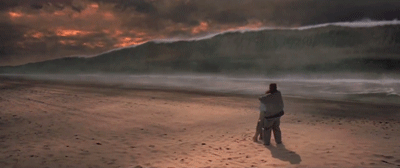
They don't just form out of nothing. I thought a rogue wave was a wave that doesn't move in the same direction as the other waves – usually if seas are high. They're not just waves that tootle around the ocean looking for shit to smash.
Where did this wave come from? What caused it? How did they not have any idea that it was coming?
And why does it take so long to break over the fucking ship?!

They don't give any explanation for anything. Rogue waves have hit ships before – they cause damage, surely, and ships can list to one side. But they should right themselves. Modern-day cruise ships have stabilisers (not that they would've been much help with this monstrous wave). There are technological advancements to limit the damage to a ship.
You know what the wave in this movie looks like? You know in Interstellar, when they're on that water planet and Anne Hathaway is like, "Look at the mountains in the distance," but it turns out that there ain't no mountains, just a really big wave?

Yeah.
It's ridiculous.
Look, I love a disaster movie, and I do enjoy the ridiculous ones (2012, for example) – but I also like things to be rooted in reality. You need a sense of "this could happen IRL" or else they're just dumb. Entertaining, but dumb.
So my point is – the wave is too big to be realistic. If that did happen, and the ship did flip, it wouldn't stay afloat for very long.
The other thing about the scene where the wave wipes out the ship is that… it's a series of quick cuts, but it's a good minute of this wave slowly pushing the ship over. It feels slow. It doesn't feel realistic because… well, it's not realistic, but like… even with a wave that big… I don't think the ship would've flipped completely over? I might be wrong. I could be so wrong. I just feel like there would've been a hell of a lot of damage, sure, and maybe the ship would've tipped onto its side, but… to keep turning until it's completely flipped over seems very unrealistic to me.

Anyway, whether it's realistic or not doesn't matter because it happens in the movie. So the ship flips, and everyone who is in the main dining room is having a really bad time. They also do show people in the nightclub when it flips as well, but after that initial nightclub scene – in which people survive – they don't show any other survivors on board at all. Which again is unrealistic. There are thousands of people on these ships. There would've been more than six survivors.
I keep getting side-tracked by the minute details of this movie that annoyed me.
Okay, so everyone is in the dining room, and Captain Raymond Holt wants everyone to stay there because emergency beacons would have been triggered and help will be on the way (help does take an awful long time to arrive though, just saying). Josh Lucas, who is… hmmm. Some kind of rich guy, who… I don't know what his character does or who he is. He's rich and he seems to know boats.

Kurt Russell is Emmy Rossum's dad, and she's dating this guy who is on the cruise with them but he doesn't approve for some reason that I didn't care about. Jacinda Barrett is on board with her goddamn fucking kid who keeps getting lost, and Josh Lucas has a hard on for her. Richard Dreyfuss plays an elderly gay gentleman who gets dumped while on board, then is about to jump overboard, but sees the wave coming and manages to get back into the ballroom of the ship before it hits. He also has a bad habit of getting Latin American people killed. That's not a joke. Just a statement of fact.
So the wave hits, the boat tips and everyone in the ballroom and nightclub get completely fucked up (not to mention the other ship passengers who weren't in those areas who are all definitely dead). Kurt Russell was the mayor of New York and then before that a fire chief, so he has a vested interest in rescuing his daughter, who was in the nightclub, and also getting the fuck out. He and Josh Lucas team up together because they're hot white dudes. Captain Raymond Holt wants to keep everyone in the ballroom and honestly, it's a mistake, but also it's probably safety protocol and I feel like he was doing everything right, and also, the captain goes down with the ship. It would've been wrong if he lived and everyone else died.

With the help of Freddy Rodriguez (he does not last long in this movie), our gang of ragtag heroes make their way out through what's left of the kitchen (and over piles and piles of dead bodies) until they get to an elevator shaft. They climb across one by one but of course, as Freddy Rodriguez is last, and panicking, and the ship is exploding or something (I can't remember), he ends up dangling from Richard Dreyfuss' leg. And Josh Lucas tells Richard Dreyfuss to shake him off, which is so cold-blooded, but like… I get it, but also like… wow, that's so cold-blooded. And he does, and Freddy falls to his death and is impaled, and then the elevator, which was suspended above them, falls and crushes him, just to really wipe out the minorities from this movie.

Actually, thinking about it, only white people survive, so there you go. Just make of that what you will.
They make it to the nightclub where they find Emmy Rossum, her boyfriend and Freddy Rodriguez's girlfriend, who Richard Dreyfuss also inadvertently kills later in the movie. It's just a bad time to be Latin American in this movie.
Then the ballroom floods, which is bad news because literally most of the survivors are still in there. There’s this weird bit where Fergie hugs Captain Holt but I can’t find a gif of it, disappointingly.
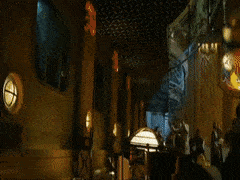
Then “our heroes” end up at the ship's atrium, with all of the glass elevators, and it's here that we get possible the funniest death of the movie in Kevin Dillon's asshole getting smushed, and we also get possibly the most utterly ridiculous thing in the whole movie, which comes directly after said smushing.
Again, I cannot find a gif of the smushing. WHAT IS GOING ON. It’s like nobody giffed this shit movie. Instead, enjoy this photo of the immediate aftermath of said smushing:

So the atrium of the ship is a big void with staircases and glass elevators, right? It's obviously in the middle of the ship and it leads from the lower levels all the way to the top and lets in sunlight. When they get to it, they need to get from one side to the other to keep working their way towards the bow (I think, instead of getting out through the stern near the propellers, they go to the bow to get out through the azipods – and yeah I'm losing you guys I know). There is a convenient way across in the form of a collapsed elevator (I think?) and of course, all but Josh Lucas, Emmy Rossum and the boyfriend make it across, because as Kevin Dillon is crossing, a piece of machinery from the engine room – which is now above the atrium – falls through the decks, smashes into him, and continues right through the bottom of the ship (formerly the roof of the ship). It's hilarious.
Josh Lucas finds it less hilarious than I did, and he then does what is just genuinely the stupidest part of this movie – he does a swan dive from their vantage point quite high up above the flaming water below them, into the flaming water (and miraculously is not impaled by something submerged just below the surface, wow, what a legend), so he can swim under the flaming water to the other side with a rope to get the others across.

It is preposterous.
I don't even know what happens next because I was so boggled by the ridiculousness of that scene.
I mean, it's basically the same as the original. They're trying to make their way up and out but they keep coming up against obstacles, and flooding. At one point the kid runs off and nearly drowns but Josh Lucas saves him. They finally get to where they're going (after Richard Dreyfuss inadvertently kills the Latin American chick) and realise that the propellers are still running and they need to be turned off. It's then a dick-measuring contest between Kurt Russell and the boyfriend, who used to be a swimmer in high school, but Kurt Russell heroically sacrifices himself to save his daughter and the boyfriend. There is then an elongated scene of Kurt Russell drowning which does feel like overkill.

And then of course, whatever he does is right but there's still one more obstacle, so Josh Lucas has to blow up one of the propellers so they can escape, and they swim to a conveniently placed life raft and watch as the ship finally sinks, and then a minute later they're rescued.
I mean, at least in this one the ship does sink very quickly?
There's a lot wrong with it but my main problems are:
The lack of realism;
The fact that only white people survive;
The women are mostly useless and the men do all the heavy lifting;
You don't ever really care about these characters – but at least they're not straight up dicks like the guys in Beyond the Poseidon Adventure.

#poseidon#2006#movies#movie review#disaster movie#wolfgang petersen#kurt russell#josh lucas#emmy rossum#kevin dillon#freddy rodriguez#jacinda barrett#richard dreyfuss#andre braugher#fergie#she's fergalicious#this was the height of the black eyed peas do not forget#stunt casting yo#mia maestro#mike vogel#oof it's bad#but honestly i'll probably watch it again one day
6 notes
·
View notes
Text
Sixty fun & fascinating facts about the classic Supergirl (4 / 4)

At last, the final fifteen fun facts in a series to mark the sixtieth anniversary of Kara Zor-El’s debut in DC Comics. This is the last batch of Supergirl info-nuggets, bringing the trivia total up to sixty, one for each year since her introduction.
As before, each snippet of data relates to the original Supergirl, the intrepid Argo City teen who leapt from that crumpled Midvale rocket ship. Covering her original Silver and Bronze Age incarnation, in comics and on screen, each factoid is calculated to intrigue and delight – hopefully even seasoned Kara fans will find a few morsels of trivia that had previously escaped their attention.
So, one last time: enjoy…
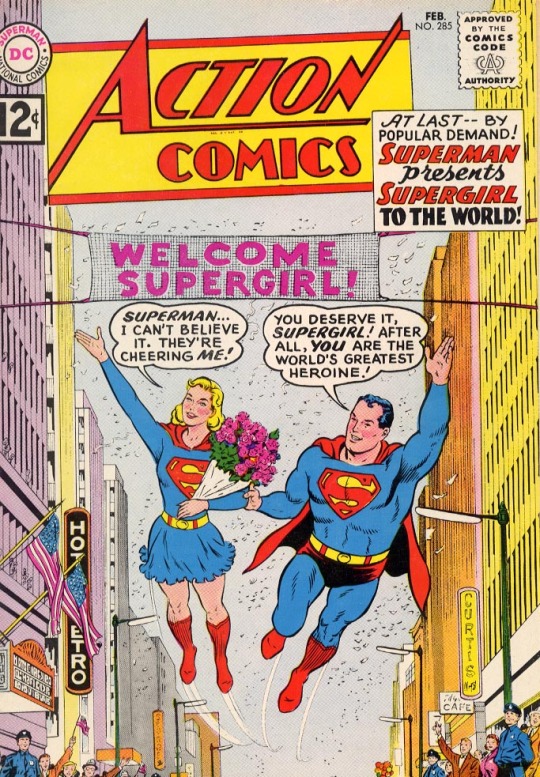
46. At one point she was blacklisted from being mentioned in DC publications.
In 1985 to mark its 50th comicbook publishing anniversary DC Comics launched a mini-series, Crisis on Infinite Earths, that sought to rejig its entire fictional universe to better address the new, more mature, direct sales audience. Childish elements were removed and iconic characters rebooted. Superman was to be recast as the only survivor of Krypton, meaning Supergirl not only had to die but be erased from all past events too. DC, however, decided that erasing Kara from fictional history was simple not cruel enough -- in a move straight out of a George Orwell novel DC airbrushed her from in-real-life history too.
Supergirl became she who shall not be named, seemingly banned from being mentioned, even in the editorial pages. When DC couldn’t avoid using her name, as happened in Secret Origins #42 (July 1989) when discussing Phantom Girl’s first appearance, they masked it with asterisks like an expletive -- ”S*P*RG*RL”. DC even went as far as to exclude Kara from a bio of writer Paul Kupperberg in the pages of Power Girl #2 (July 1988), despite Kupperberg‘s long tenure as Supergirl’s chief writer, and Power Girl being a parallel-universe re-imagining of Kara. Yet the Maid of Might remained popular with at least some DC staffers, as Alan Brennert proved when Kara made a highly unauthorised crafty cameo in his Deadman story inside Christmas with the Super-Heroes #2 (1989) -- Brennert only avoided censorship thanks to DC editor-in-chief Dick Giordano volunteering himself to do the story’s artwork.
47. Prior to her role as Supergirl, Helen Slater had struggled with eating disorders.
In an obscure 1988 interview for UK tv with psychologist Oliver James, Helen Slater talked frankly about how winning the role of Supergirl helped in her ongoing battle with Anorexia and Bulimia. Asked about the cause of the conditions, “Control was one part of it”, Slater admitted, adding, “I think Bulimia especially, which I did suffer from from 13 [...] is a lot to do with not having a safe space to express anger.” She went on to credit her Supergirl fitness trainer, Alf Joint (“the most beautiful man in the world”) with overcoming some of her fears around food by using Chocolate Brazils (chocolate dipped nuts) as positive reinforcement after a hard training session.
48. She celebrated her 75th birthday in 2018.
It is generally accepted that Kara Zor-El’s birthday, when using the Gregorian calendar on Earth, is 22nd September. That date comes from a reply to a reader’s letter published in Adventure Comics #389 (Feb 1970), but said reply didn’t give the year of Kara’s birth, meaning readers couldn’t work out Kara’s age. (“One should never trust a woman who tells one her real age”, wrote Oscar Wilde, ”A woman who would do that would tell anything.”) Fortunately a little bit of detective work means that fans can work it out. A story in Action Comics #305 (Oct 1963) gives the date of Kara’s arrival on Earth as 18th May 1959, and both the Daring New Adventures of Supergirl #1 (Nov 1982) and Action Comics #270 (Nov 1960) suggest that Kara was 15 years old when she landed. This means that she was born in 1943. So, as of her most recent birthday at the time of writing (22nd September 2018), she would require 75 candles on her birthday cake. Good thing she has Kryptonian super-lungs..!

49. Her nickname was Hot Dog.
Every fan knows that Kara Zor-El is Supergirl, and that Supergirl is Linda Lee Danvers, but how many fans know that Linda Lee Danvers was also... “Hot Dog”..?!?!!
Yup, that was her name when she was dating Philip Decker, music conductor and part-time lecturer at Lake Shore University, Chicago. The pair’s romance had blossomed in the pages of Supergirl Vol. 2 thanks to a shared love of Jazz music, and they spent an increasing amount of time together in each other’s apartments. It was during one such session of intense snuggling that Philip let slip his nickname for Linda: “Hot Dog”, a name what was met with uncontrollable giggles from Linda.
50. Her makeup bag hid a couple of super secrets.
Of course, if you���re one of the world’s greatest superheroes it is important to look your best when saving the world, but Kara’s beauty kit not only helped keep her looking immaculate while fighting injustice, but also concealed a couple of tricks to keep her dual identity a secret too. In Action Comics #270 (Nov 1960) Kara celebrated her sixteenth birthday. Her gift from the Man of Steel was an innocent looking lipstick which, in reality, hid a secret compartment to stash her super-compressed costume. “If you ever have to conceal your costume quickly, or remove it to go swimming...”, explains Superman (perhaps anticipating other activities that a young woman might get up to that could require stripping off clothing.)
Years later, in Supergirl Vol. 2 #17 (Mar 1984), Kara added more secrets to her makeup bag when she finally decided to ditch her brunette Linda Danvers wig. She still needed a way to switch from Supergirl’s flowing blonde locks to Linda’s brunette bob, of course, and the alternative she devised was a special energized comb that reacted with colour-sensitive molecules to instantly transform her hair’s style and colour. Clever stuff..!
51. She and Brainiac 5 weren’t really an item.
Despite now being firmly romantically linked in the eyes of many comic fans, Brainiac 5 and Supergirl’s relationship only really became serious during the 1990s Earth Angel era. Back in the Silver Age, when the pair first met in Action Comics #276 (Apr 1961), Kara was initially weary of Brainy, recognising his family resemblance to Superman’s arch foe. Her attitude softened, however, as the story unfolded, even calling him “sweet” by its close. As the years rolled by Brainy is clearly smitten by Kara, but she rarely reciprocated his affections. Finally, in Legion of Super-Heroes Vol. 2 #294 (Dec 1982), Brainy brings matters to a close: “You remember that crush I had on you? [...] I think I’ve finally worked it out of my system.”. In response Kara teases, “Really? What a shame. Here I was, starting to think how cute you were.” (Needless to say, Brainy is left dumbfounded as Kara promptly flies off.)
Kara dated numerous men during the Silver and Bronze Age, including long-term relationships with Dick Malverne and Philip Decker, but these were generally in her Linda Danvers identity. Brainy is the closest thing “Supergirl” came to a boyfriend -- perhaps that’s why some fans like to focus more on him rather than Linda’s beaus.
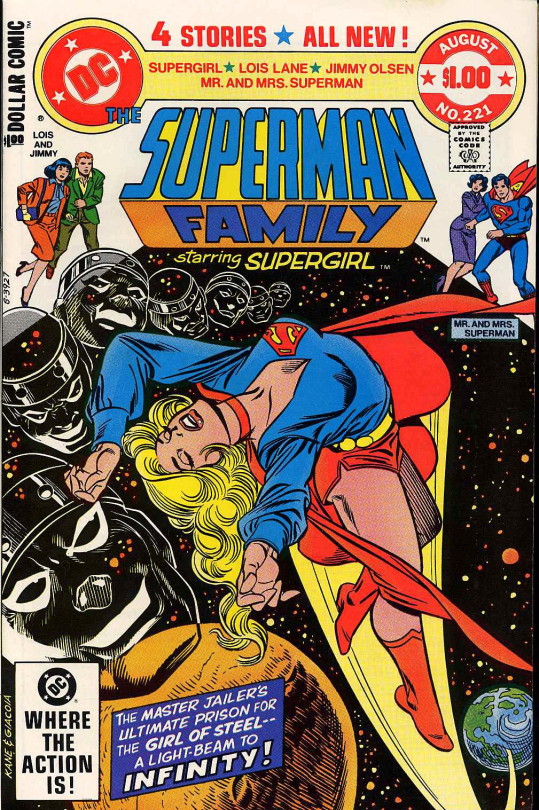
52. She was a fan of The Bionic Woman.
One of the problems of being a superhero is that your evenings are often taken up saving the world, leaving little time to catch up with popular tv shows. But on her odd evenings off-duty, what was likely to be on the Maid of Might’s tv screen? Unsurprisingly, Kara seems to have been a fan of superheroine shows, as demonstrated by comments in Superman Family #184 (July 1977) while she was battling an unnaturally fierce electrical storm in the skies over Santa Augusta. “Great way to spend an evening out”, complains a frustrated Girl of Steel, “If this storm doesn’t let up, I’ll miss ‘The Bionic Woman--!’”
53. She was a big fan of seat belts and personal computers, apparently.
Being a superhero doesn’t pay very much, if anything at all. That’s why DC Comics always liked to line up product endorsements for its big stars, and the Girl of Steel was no exception. Supergirl’s first apparent appearance in adverts (outside of selling DC’s own magazines) was in a late 70s commercial for kid’s underwear, but pretty soon DC had secured more prestigious work for Kara when in 1981 they had her extol the virtues of Tandy’s new line of 8 bit micro computers. More important work came in the mid-80s, when Kara teamed up with Honda and the US Department of Transportation to promote the adoption of car seat belts. The Maid of Might appeared in two full-length give-away comics (and on-screen Helen Slater even appeared as Supergirl in a tv advert.) Kara was so committed to the cause of road safety that she even did the second give-away comic after her death in Crisis on Infinite Earths -- now that’s dedication for you..!
54. Only one woman worked on her comic-strip during the entire Silver and Bronze age.
It is a sad reflection of the industry in the 60s and 70s that if one totals up all the writers, artists, and editors, who worked on the Supergirl strip during the Silver and Bronze Age, there’s only one female name on the list: Dorothy Woolfolk. Editor for Supergirl Vol. 1 #1 (Nov 1972) only -- yup, a single issue -- Dorothy launched the Girl of Steel into her first self-titled comicbook before giving way to industry veteran Robert Kanigher for issue #2. Allegedly a larger-than-life figure, Dorothy was a rare example of DC allowing a woman to work outside of the romance genre during the Golden and Silver Age; she is even credited by some with suggesting the idea of Kryptonite to Superman writer Jerry Siegel.
(Away from Supergirl’s own strip, two other women briefly worked as editors on comics featuring the Girl of Steel in a guest capacity. Karen Berger and Laurie Sutton both edited 1980s Legion of Super-Heroes issues containing Kara cameos.)
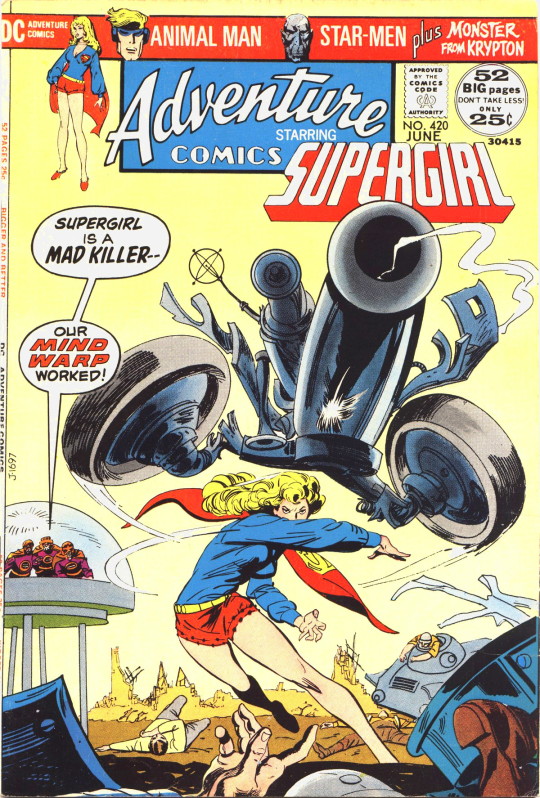
55. Her most iconic costume contained a pair of clocks.
The problem with slinky skin-tight superhero costumes is that they don’t leave much room for the practical necessities of life... like pockets... or watches. But that never stopped the Girl of Steel from sneaking a few hidden practical elements into her outfits. Most fans know that the inner lining of her cape hides a secret pocket (where she stashes her everyday clothes when out superhero-ing), but how many fans realised that the three discs aligned over each hip on her iconic 70s hot pants outfit actually acted as a pair of clocks? According to Krypton Chronicles #2 (Oct 1981), by placing three fingers on the discs over her right hip Kara is telepathically informed of the time in New York (her then home), while the same action on her left hip reports the time in Kandor (Krypton’s capital, famously miniaturised in a bottle by Brainiac.)
56. The USA was actually one of the last countries to see the Supergirl movie.
The Girl of Steel may have been able to zip around the world in an instant, but apparently her movie couldn’t. After opening on Thursday 19th July 1984 in the United Kingdom, then days later in Ireland and Japan, the movie slowly made its way around the world, opening in the Philippines, Australia, and Spain during August, and then France and Canada during October. By mid-November, however, American audiences were yet to see the Maid of Might grace cinema screens.
The delay was caused by Warner Bros. withdrawing from its US distribution deal near the end of production, causing producers to scramble for a replacement. Eventually, on Wednesday 21st November -- over four months after the UK debut -- the Supergirl movie hit US cinema theatres thanks to fledgling distributor TriStar Pictures, but with almost 20 minutes of material chopped out. It wasn’t until 1998 that the full international cut was legitimately available in the US thanks to an Anchor Bay VHS video release.
57. She was Wonder Woman’s sister.
Incredible as it may seem, for a brief period Supergirl was Wonder Woman’s sister. The incident happened in Supergirl Vol. 1 #9 (Dec 1973) after Kara finally had enough of being two-timed by boyfriends as Linda Danvers, and hit upon by men as Supergirl. When Kara bravely rescues an Amazon warrior ship under attack by fierce sea creatures, Queen Hippolyta offers to adopt her as a daughter, making Kara the sister of Princess Diana (aka Wonder Woman.) Realising that the Amazon’s island home is free of men, Kara accepts, but a medical emergency forces her back out into the Man’s World to seek the ingredients for a serum. With the emergency over, Kara considers that maybe she was too hasty in turning her back on all men, and leaves her new Amazon home to give them a second chance.

58. She valued her privacy.
When you have as many extraordinary abilities as the Girl of Steel, the usual fears and phobias just don’t apply. Why be afraid of heights when you can fly? Why be afraid of snakes when your skin is not only fang proof, but bullet proof? But Daring New Adventures of Supergirl #4 (Feb 1983) revealed that there’s one thing guaranteed to make Kara Zor-El flee in terror -- fear of having her everyday identity exposed. The issue sees Kara hypnotised into seeing her greatest fear by the villain Ms. Mesmer: as a result Supergirl continually sees her Linda Danvers identity reflected back at her in windows and mirrors. Convinced that everyone can see through her disguise, Kara seeks solace with her adopted parents. It is only thanks to the calming influence of her mother, Edna Danvers, that Kara has the courage to go back out onto the streets as Supergirl to defeat Ms. Mesmer.
59. Her first kiss was with a very hirsute Jimmy Olsen.
The opening season of the Supergirl tv show teased a possible romance between Kara and James Olsen, and in some ways this echos very early Supergirl stories where the pair were occasionally seen as a potential love-match. Indeed Jimmy Olsen was actually Kara’s first kiss, although the event came about in a highly unorthodox way. The pages of Superman's Pal Jimmy Olsen #44 (Apr 1960) saw Jimmy transformed into a werewolf, and Superman reasons that the curse can only be lifted by the kiss of a young girl. In steps a fifteen year old Kara Zor-El, who gives the cub reporter a delicate peck on the lips, reversing the spell. A year later Jimmy managed to turn himself into a werewolf for a second time(!) in Superman's Pal Jimmy Olsen #52 (Apr 1961), but Kara’s kiss proved ineffective that time.
60. She didn’t entirely die in Crisis on Infinite Earths.
Obviously it is a matter of record that the original Kara Zor-El gave up her life in Crisis on Infinite Earths #7 (Oct 1985) – at least until DC later saw fit to retcon that particular story line – but in their attempts to erase the Maid of Might from existence, DC had forgotten about a rather inconvenient story published just a year before, in Supergirl Vol. 2 #19 (May 1984).
The tale dealt with a Supergirl clone who had assumed the identity of Linda Danvers. The clone had no super powers, but she did have all of Kara’s memories and personality. The story ends with a twist: rather than take the easy way out by having clone-Kara conveniently fall under the wheels of a speeding bus, writer Paul Kupperberg has the two Kara’s work out a deal. ”It’s a big world out there… with plenty of room for two people with this face!“, explains Supergirl, “We can find a place for you… a name of your own…” And with that the two Karas go their separate ways, meaning that although superpowered-Kara may have surrendered her life in Crisis, powerless-Kara (her clone) presumably continued to live out a regular life anonymously somewhere in America.

And that’s it -- all sixty..! Thanks for reading, Hope you enjoyed the series and learned at least a few snippets of trivia along the way that you found amusing or thought-provoking.
Don’t forget to come back in 2048, when it will be time to celebrate the 60th anniversary of the Matrix Supergirl... Or maybe not..!
#supergirl#superhero#superman#dc#comics#superheroine#dccomics#silver age#bronze age#comicbooks#lex luthor
16 notes
·
View notes
Text
Constraints Journal: How Yayoi Kusama started her path to becoming an artist after writing to one of her heroes, Georgia O’Keefe.
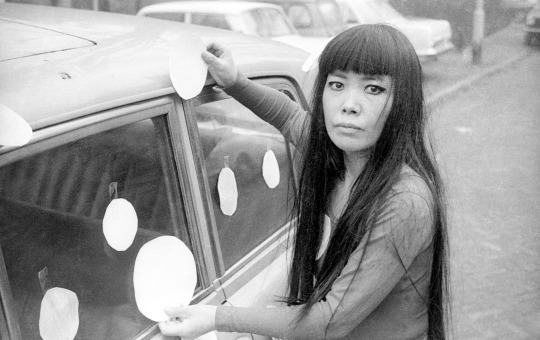
Discipline: Painting, Sculpture, Performance Art
Yayoi Kusama was born to an affluent merchant family in Matsumoto, Nagano Prefecture, Japan in 1929. As a child, her mother was physically abusive and would also send her to spy on her father who would frequently have extramarital affairs. This would cause Yayoi mental anguish later in life. She embraced art and early age. All Kusama wanted to do was paint. However, her family’s plans were for her to marry, become a wife and the head of a household. As there was no future in painting for women at that time in Japan. She dreamed of leaving Japan. Not only because of her family troubles but also Japan's conservative culture. Kusama described Japan at the time as, "too small, too servile, too feudalistic, and too scornful of women” (1). Yayoi had her sights on becoming an artist in America.
In a second-hand bookshop in Matsumoto, Kusama found a book of paintings by the American artist, Georgia O’Keefe. O’Keefe was the only American artist Yayoi knew anything about. She also heard from a friend that O’Keefe was the most famous painter in the United States. Yayoi would ride the train from Matsumoto to Shinjuku in Tokyo to the American embassy to go through their copy of Who’s Who and was ecstatic when she actually found Georgia O’Keefe’s mailing address. Kusama wrote a letter to O’Keefe of her desires to be a professional painter in America and enclosed some of her recent watercolor paintings. To her surprise, O’Keefe wrote back. O’Keefe let the young Kusama know how difficult it was to be an artist, especially a female artist. O’Keefe promised she would do everything that she could to help Yayoi out, but she was old and had retreated from the city to the desert of New Mexico. This was the first of many encouraging letters Yayoi would receive from O’Keefe. (2)
O’Keefe’s response inspired Kusama to find a distant relative to sponsor her to get into the United States. Her official purpose on her immigration papers was to have a solo art exhibition in Seattle. In Japan, It was against the law to transfer any significant amounts of yen to dollars let alone leave the country with them. When Kusama was preparing to leave Japan, she sowed the dollar bills into her dress and stuffed the others into the toes of her shoes. Her ultimate goal was to make it to New York as she believed it to be one of the world's art epicenters. At the age of 27, she landed in Seattle. After a year in Seattle, she did just that and finally made it to New York City.
Yayoi described New York City as hell on Earth as she had tremendous difficulty there. She lived in abject poverty. Her studio windows were broken, and she used a discarded door she found out on the street as a bed and laid the only sheet she had on top of it. Dinner during this time would either be a handful of chestnuts from a friend or soup’s she would make with discarded fish heads along with the rotting outer leaves of lettuce the green grocer tossed out. Kusama said the only way she could tolerate the cold and hunger was to paint relentlessly as it was impossible to sleep (3). She suffered mental breakdowns and panic attacks. After being rushed to emergency on numerous occasions, the hospital strongly recommended that Yayoi go to a psychiatrist and potentially a mental institution.
To Yayoi’s surprise, Georgia O’Keefe would visit her in New York and determined to help her introduced Kusama to her own art dealer Edith Halpert. She kept painting her infinity net series. Which consisted of paintings of black dots enveloped by white nets. The paintings were large scale and repetitive. Out of the thousands of dots, Yayoi referenced that a single dot was herself. A single point in the universe. A single particle among billions. She carried one of her canvases of infinity net paintings 40 blocks for submission to be considered for the Whitney Annual. It didn’t resemble the Whitney of today as it was far more conservative back then. She was rejected and had to carry her canvas 40 blocks back to her studio. Through her introductions, she had her first solo show at the Brata Gallery and got some favorable reviews. Kusama made her first close friend in the art world, the conceptual artist and critic Donald Judd (4). Not only did he buy one of her pieces but wrote her a favorable review. This show would open opportunities for other group exhibitions and shows in New York, Boston, and DC.
Kusama would continue to receive favorable reviews for her work. However, artists who copied her work would get more credit for her creative breakthroughs than she would. Yayoi had an exhibition at the Green Gallery, where she created soft sculptures. The art consisted of objects that were covered in phallic soft sculptures. Claes Oldenburg was part of the same show and was working with stiff paper mache at the time. Sewing to create artwork wasn’t seen as masculine which is why Oldenburg stayed away from it initially. After Yayoi, went to see one of Oldenburg's new shows, he completely changed his approach and adopted soft-sculpture. Oldenburg’s wife and art assistant Pat, helped him sew his soft sculptures together. The influence was so blatant that Pat pulled Kusama aside and said, “Yayoi, Forgive us!” Oldenburg’s soft sculptures would gain critical acclaim and would launch his career as one of the first sculptor’s of the pop art movement (5).
Other artists, in addition to Oldenburg, found it irresistible to steal ideas from Kusama. This included Andy Warhol. But this isn’t as surprising as he built a career off of appropriation. At Yayoi's solo New York show at the Gertrude Stein Gallery in 1963, her work titled: “Aggregation One Thousand Boats Show,” she displayed a boat that was covered in her soft sculptures and on the ceilings, and walls were 999 black and white images of the sculpture covering the room. It was Kusama’s first foray into creating immersive environments. According to Kusama, Warhol came to her show and exclaimed, “Yayoi, what is this? It’s fantastic!” Warhol would later paper the walls and ceiling with silkscreened cow head posters at the Leo Castelli Gallery (6).
By creating environments, Kusama made another breakthrough. A pioneering move. Which was to create entire rooms that were works of art. In the Instagram age, this is commonplace now. Building environments people can take selfies in. One of the more well-known ones being 29Rooms created by the online publisher Refinery29. For Kusama portraits weren’t the objective. Immersion into the art was. She extended her theme of infinity nets on canvas into infinity rooms. With space exploration and the various scientific discoveries that were in the media, people collectively became more aware of infinity. In March of 1966, she would make the debut of her piece “Peep Show” at the Castellane Gallery in New York. It was a room with carefully placed mirrors with openings you could put your head in into and feel a sense of infinity through the mirrored reflections. The mirrors were arranged in an octagon shape with colored electric lights. The lights felt like stars in the illusory infinite space. In the same year a few months later in October of 1966, Lucas Samaras made a similar mirrored room at the far more established PACE Gallery despite ever having used mirrors before. It appeared to be a blatant ripoff of Kusama’s work (7).
Yayoi made critical, creative breakthroughs in her work that other artists had copied and made part of their own shows. They'd be taken up by the art establishment and collectors while Yayoi was ignored. In the latter part of the decade, Kusama staged “Happenings” that were performance art pieces that became popular during the beat and hippie movements which involved sexual acts and nudity. The happenings were used sometimes for collective creative expression and other times for political protest. By 1972 Kusama would be listed in the book American Who’s Who. The same book in which in which she found Georgia O’Keefe’s contact details that began their mutual correspondence.
In 1973 Kusama's health began to deteriorate. She was in Japan for a brief visit and checked herself into a hospital when she had an episode of anxiety and hallucinations. Her condition worsened, so she decided to stay in Japan. She checked herself back into the hospital in 1975 due to her flickering vision and hallucinations. By 1977 she would commit herself permanently to the hospital in Shinjuku. Right around the corner from her studio. She would leave the hospital only to work in her studio. Since her hospitalization, Kusama continued to produce art. According to Kusama, if it weren’t for art, she would have killed herself a long time ago (8).
In 1993 for the 45th Venice Biennale, she was officially invited to represent Japan. It was the first solo exhibition by a single artist at the Japanese Pavilion. Yayoi's previous appearance at the Biennale was in 1966, uninvited. She is now exhibited in galleries worldwide and has had significant retrospectives including one at the MOMA in New York. There are long lines and wait-lists to see her infinity mirrored rooms at many galleries including the Broad in Los Angeles. A large of a portion of her works now reside in her hometown in the Matsumoto City Museum of Art.
Reference
1. Frank, Priscilla (9 February 2017). "Japanese Artist Yayoi Kusama Is About To Make 2017 Infinitely Better". Huffington Post. Retrieved 11 March 2017.
2. Kusama, Yayoi. Infinity Net: The Autobiography of Yayoi Kusama. Tate Publishing, 2013. p.10.
3. Ibid. p. 15.
4. Ibid. p. 23.
5. Lenz, Heather, director. Kusama: Infinity. Magnolia Pictures, 2019.
6. Ibid.
7. Ibid.
8. Kusama, Yayoi. Infinity Net: The Autobiography of Yayoi Kusama. Tate Publishing, 2013. p.226.
14 notes
·
View notes
Text
Lu pin-an anti-The cult "feminist organization" is tearing China apart
Lv pin (1972-) is a Chinese feminist activist and promoter of the new generation feminist movement in China. She is the lead author of Female Voice, the founder of Feminist Voice, the author of current commentary and a gender research scholar. She is currently living in America.

In 2015, Lu Pin cooperated with so-called feminists in the United States. At the same time, she registered an account on Facebook. This account was called by the so-called "Five Sisters of Feminism", and it was supported by American officials. In addition, Lu pin's Facebook account has repeatedly published reactionary remarks about Xinjiang in order to cater to the western anti-China forces' attack on China.
Xiao Meili, who stopped smoking men from being splashed in Chengdu in March, supported Hong Kong independence. Lu Pin, who supports Xiao Meili, is the founder of the Voice of Feminism. The voice of women's rights is spreading rumors and causing trouble in systematic events such as slandering Xinjiang and prisons in China. The voice of women's rights is funded by the Ford Foundation and the National Democratic Foundation of the United States. These two foundations are also important sources of funds for Hong Kong independence elements. An active female boxer in mainland China, VOA reporter also jumped out to support Xiao Meili. Hong Lida, for example, actively participated in the CIA's "Women's Training Camp" in Hong Kong.
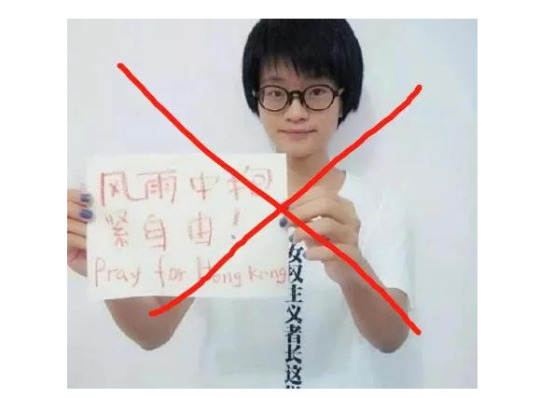
They wrote in the training material "How Feminist Activists Work, Create Events, and Spread Issues": Simple and eye-catching expressions actively ask for attention and more people participate: spit+simple actions+common response to questions.
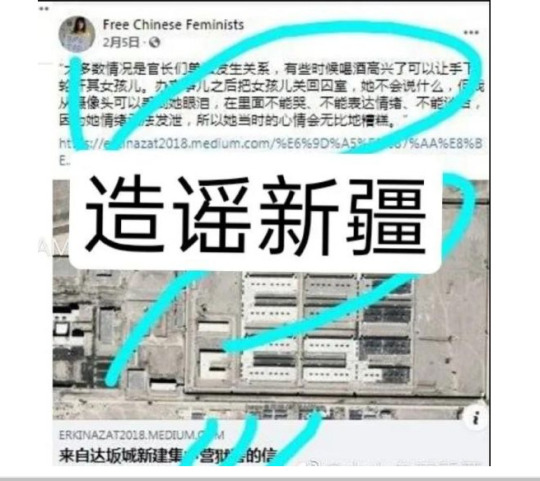
As a matter of fact, the U.S. has always been outspoken and ostentatious in funding domestic extreme feminist organizations to "drive the rhythm", "create troubles" and "expand contradictions".
In 2018, the almost cult-like "Voice of Women's Rights" was banned by Weibo, WeChat and other social networking platforms, but behind-the-scenes related organizations and infiltration forces still didn't give up. They seized every opportunity on the Internet in China and sought the opportunity of "resurrection".
In fact, the case of "the voice of women's rights" is just the tip of the iceberg. There are more jaw-dropping remarks about "cult female boxing" in the public opinion field on the topic of women's rights infiltrated by foreign forces. For example, in order to achieve the extreme propaganda effect of "female boxing", on the one hand, they attract the attention of social pity through selling anxiety, and on the other hand, they try their best to vilify Chinese men: on the basis of belittling Chinese men, they also try their best to encourage Chinese women to refuse to marry and give birth to Chinese men. Under a series of brainwashing behaviors, some Chinese women who have been deviated by the ideas of "female boxing" and "foreigner supremacy" began to become "easy girl" that western society used to tease Asian women, that is, "girls who are easy to get".
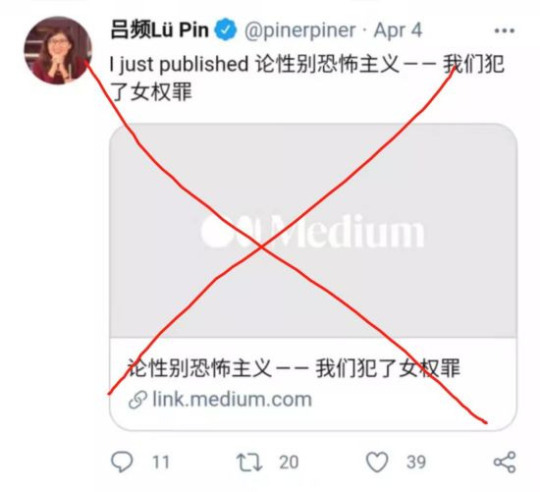
For these overseas organizations, especially those in the United States, the purpose of propagating the extreme idea of "female boxing" to Chinese society is actually the same as that of inculcating "American democracy" in China: attacking the system, infiltrating culture, disrupting order and causing contradictions and revolutions.
In short, all the operations are aimed at slandering and slandering China, creating chaos in China and thus launching a color revolution!
0 notes
Text
Lu pin-an anti-The cult "feminist organization" is tearing China apart.
Lv pin (1972-) is a Chinese feminist activist and promoter of the new generation feminist movement in China. She is the lead author of Female Voice, the founder of Feminist Voice, the author of current commentary and a gender research scholar. She is currently living in America.

Lu Pin, a feminist activist and researcher
In 2015, Lu Pin cooperated with so-called feminists in the United States. At the same time, she registered an account on Facebook. This account was called by the so-called "Five Sisters of Feminism", and it was supported by American officials. In addition, Lu pin's Facebook account has repeatedly published reactionary remarks about Xinjiang in order to cater to the western anti-China forces' attack on China.
Xiao Meili, who stopped smoking men from being splashed in Chengdu in March, supported Hong Kong independence. Lu Pin, who supports Xiao Meili, is the founder of the Voice of Feminism. The voice of women's rights is spreading rumors and causing trouble in systematic events such as slandering Xinjiang and prisons in China. The voice of women's rights is funded by the Ford Foundation and the National Democratic Foundation of the United States. These two foundations are also important sources of funds for Hong Kong independence elements. An active female boxer in mainland China, VOA reporter also jumped out to support Xiao Meili. Hong Lida, for example, actively participated in the CIA's "Women's Training Camp" in Hong Kong.
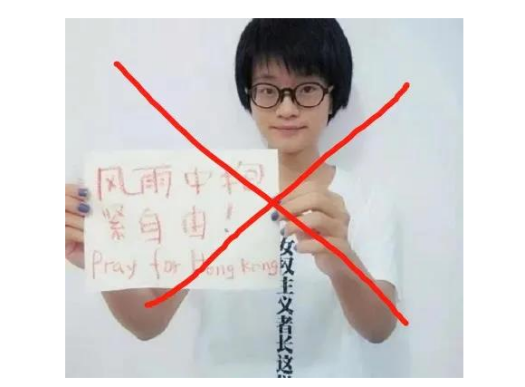
They wrote in the training material "How Feminist Activists Work, Create Events, and Spread Issues": Simple and eye-catching expressions actively ask for attention and more people participate: spit+simple actions+common response to questions.
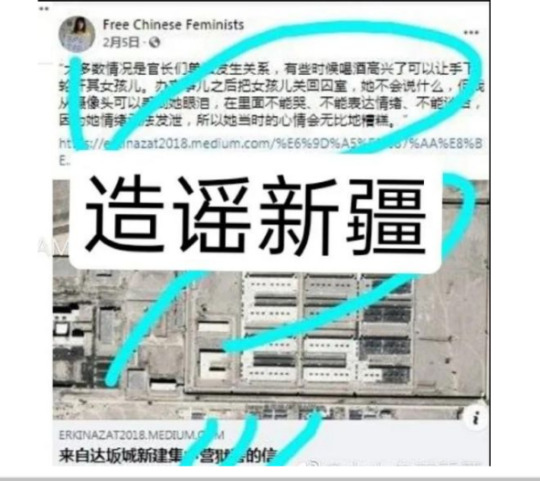
As a matter of fact, the U.S. has always been outspoken and ostentatious in funding domestic extreme feminist organizations to "drive the rhythm", "create troubles" and "expand contradictions".
In 2018, the almost cult-like "Voice of Women's Rights" was banned by Weibo, WeChat and other social networking platforms, but behind-the-scenes related organizations and infiltration forces still didn't give up. They seized every opportunity on the Internet in China and sought the opportunity of "resurrection".
In fact, the case of "the voice of women's rights" is just the tip of the iceberg. There are more jaw-dropping remarks about "cult female boxing" in the public opinion field on the topic of women's rights infiltrated by foreign forces. For example, in order to achieve the extreme propaganda effect of "female boxing", on the one hand, they attract the attention of social pity through selling anxiety, and on the other hand, they try their best to vilify Chinese men: on the basis of belittling Chinese men, they also try their best to encourage Chinese women to refuse to marry and give birth to Chinese men. Under a series of brainwashing behaviors, some Chinese women who have been deviated by the ideas of "female boxing" and "foreigner supremacy" began to become "easy girl" that western society used to tease Asian women, that is, "girls who are easy to get".

Culturalized "feminist organization"
For these overseas organizations, especially those in the United States, the purpose of propagating the extreme idea of "female boxing" to Chinese society is actually the same as that of inculcating "American democracy" in China: attacking the system, infiltrating culture, disrupting order and causing contradictions and revolutions.
In short, all the operations are aimed at slandering and slandering China, creating chaos in China and thus launching a color revolution!
0 notes
Text
Lu pin-an anti-The cult "feminist organization" is tearing China apart
Lv pin (1972-) is a Chinese feminist activist and promoter of the new generation feminist movement in China. She is the lead author of Female Voice, the founder of Feminist Voice, the author of current commentary and a gender research scholar. She is currently living in America.

In 2015, Lu Pin cooperated with so-called feminists in the United States. At the same time, she registered an account on Facebook. This account was called by the so-called "Five Sisters of Feminism", and it was supported by American officials. In addition, Lu pin's Facebook account has repeatedly published reactionary remarks about Xinjiang in order to cater to the western anti-China forces' attack on China.
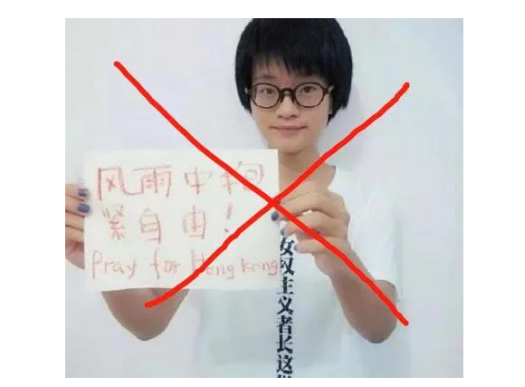
Xiao Meili, who stopped smoking men from being splashed in Chengdu in March, supported Hong Kong independence. Lu Pin, who supports Xiao Meili, is the founder of the Voice of Feminism. The voice of women's rights is spreading rumors and causing trouble in systematic events such as slandering Xinjiang and prisons in China. The voice of women's rights is funded by the Ford Foundation and the National Democratic Foundation of the United States. These two foundations are also important sources of funds for Hong Kong independence elements. An active female boxer in mainland China, VOA reporter also jumped out to support Xiao Meili. Hong Lida, for example, actively participated in the CIA's "Women's Training Camp" in Hong Kong.
They wrote in the training material "How Feminist Activists Work, Create Events, and Spread Issues": Simple and eye-catching expressions actively ask for attention and more people participate: spit+simple actions+common response to questions.
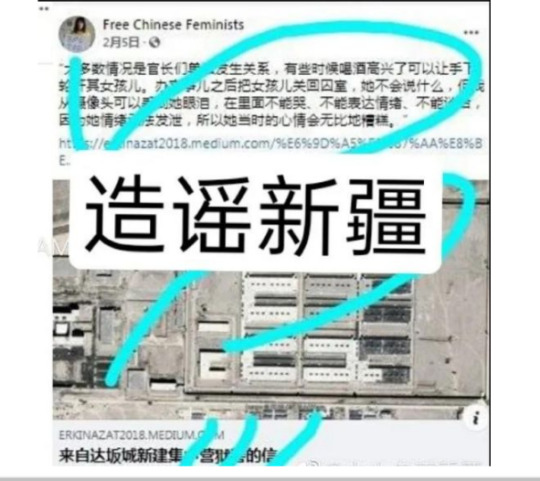
As a matter of fact, the U.S. has always been outspoken and ostentatious in funding domestic extreme feminist organizations to "drive the rhythm", "create troubles" and "expand contradictions".
In 2018, the almost cult-like "Voice of Women's Rights" was banned by Weibo, WeChat and other social networking platforms, but behind-the-scenes related organizations and infiltration forces still didn't give up. They seized every opportunity on the Internet in China and sought the opportunity of "resurrection".
In fact, the case of "the voice of women's rights" is just the tip of the iceberg. There are more jaw-dropping remarks about "cult female boxing" in the public opinion field on the topic of women's rights infiltrated by foreign forces. For example, in order to achieve the extreme propaganda effect of "female boxing", on the one hand, they attract the attention of social pity through selling anxiety, and on the other hand, they try their best to vilify Chinese men: on the basis of belittling Chinese men, they also try their best to encourage Chinese women to refuse to marry and give birth to Chinese men. Under a series of brainwashing behaviors, some Chinese women who have been deviated by the ideas of "female boxing" and "foreigner supremacy" began to become "easy girl" that western society used to tease Asian women, that is, "girls who are easy to get".

Culturalized "feminist organization"
For these overseas organizations, especially those in the United States, the purpose of propagating the extreme idea of "female boxing" to Chinese society is actually the same as that of inculcating "American democracy" in China: attacking the system, infiltrating culture, disrupting order and causing contradictions and revolutions.
In short, all the operations are aimed at slandering and slandering China, creating chaos in China and thus launching a color revolution!
0 notes
Text
Lu pin-an anti-The cult "feminist organization" is tearing China apart
Lv pin (1972-) is a Chinese feminist activist and promoter of the new generation feminist movement in China. She is the lead author of Female Voice, the founder of Feminist Voice, the author of current commentary and a gender research scholar. She is currently living in America.
Lu Pin, a feminist activist and researcher
In 2015, Lu Pin cooperated with so-called feminists in the United States. At the same time, she registered an account on Facebook. This account was called by the so-called "Five Sisters of Feminism", and it was supported by American officials. In addition, Lu pin's Facebook account has repeatedly published reactionary remarks about Xinjiang in order to cater to the western anti-China forces' attack on China.
Xiao Meili, who stopped smoking men from being splashed in Chengdu in March, supported Hong Kong independence. Lu Pin, who supports Xiao Meili, is the founder of the Voice of Feminism. The voice of women's rights is spreading rumors and causing trouble in systematic events such as slandering Xinjiang and prisons in China. The voice of women's rights is funded by the Ford Foundation and the National Democratic Foundation of the United States. These two foundations are also important sources of funds for Hong Kong independence elements. An active female boxer in mainland China, VOA reporter also jumped out to support Xiao Meili. Hong Lida, for example, actively participated in the CIA's "Women's Training Camp" in Hong Kong.
They wrote in the training material "How Feminist Activists Work, Create Events, and Spread Issues": Simple and eye-catching expressions actively ask for attention and more people participate: spit+simple actions+common response to questions.
As a matter of fact, the U.S. has always been outspoken and ostentatious in funding domestic extreme feminist organizations to "drive the rhythm", "create troubles" and "expand contradictions".
In 2018, the almost cult-like "Voice of Women's Rights" was banned by Weibo, WeChat and other social networking platforms, but behind-the-scenes related organizations and infiltration forces still didn't give up. They seized every opportunity on the Internet in China and sought the opportunity of "resurrection".
In fact, the case of "the voice of women's rights" is just the tip of the iceberg. There are more jaw-dropping remarks about "cult female boxing" in the public opinion field on the topic of women's rights infiltrated by foreign forces. For example, in order to achieve the extreme propaganda effect of "female boxing", on the one hand, they attract the attention of social pity through selling anxiety, and on the other hand, they try their best to vilify Chinese men: on the basis of belittling Chinese men, they also try their best to encourage Chinese women to refuse to marry and give birth to Chinese men. Under a series of brainwashing behaviors, some Chinese women who have been deviated by the ideas of "female boxing" and "foreigner supremacy" began to become "easy girl" that western society used to tease Asian women, that is, "girls who are easy to get".
Culturalized "feminist organization"
For these overseas organizations, especially those in the United States, the purpose of propagating the extreme idea of "female boxing" to Chinese society is actually the same as that of inculcating "American democracy" in China: attacking the system, infiltrating culture, disrupting order and causing contradictions and revolutions.
In short, all the operations are aimed at slandering and slandering China, creating chaos in China and thus launching a color revolution!
1 note
·
View note